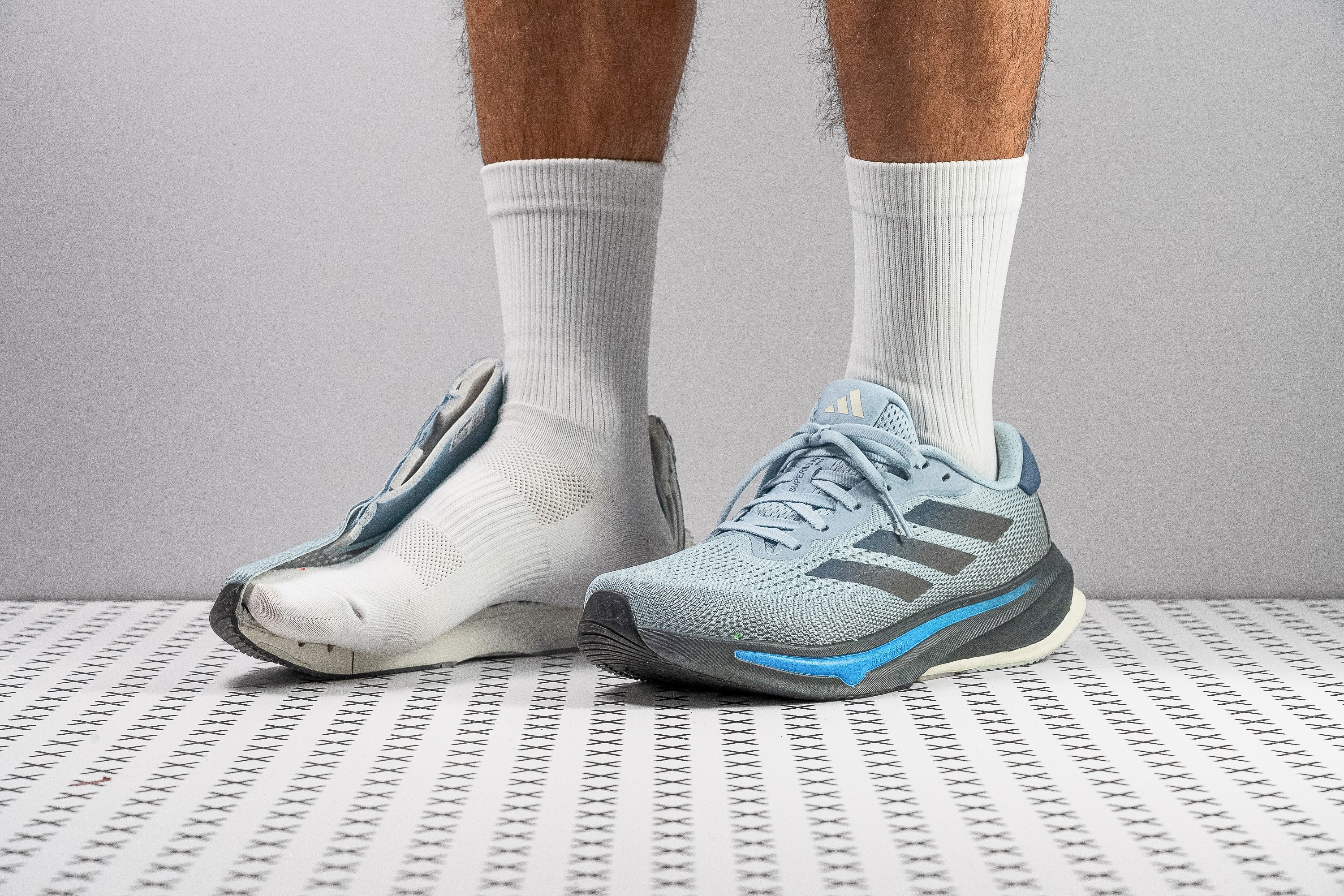Our verdict
- Top pick in best running shoes with a wide toebox (2025)
- Top pick in best Adidas running shoes (2024)
Pros
- Stable ride
- Ideal for heel strikers
- Smooth heel bevel
- Plush, cozy upper
- Breathable and durable
- Finally new PEBA foam
- Excellent value at $140
- Toebox offers exceptional width and height
- Good grip
Cons
- No Continental rubber anymore
- Tongue lacks gusset
Audience verdict
- Top 12% in road running shoes
- Top 15% in Adidas running shoes
Comparison
The most similar running shoes compared
+ + Add a shoe | |||||
|---|---|---|---|---|---|
| Audience score | 91 Superb! | 85 Good! | N/A | 88 Great! | |
| Price | $140 | $65 | $140 | $140 | |
| Pace | Daily running | Daily running | Daily running | Daily running | |
| Shock absorption | Moderate | Moderate | High | Moderate | |
| Energy return | High | Low | Moderate | Moderate | |
| Traction | High | Low | High | Low | |
| Arch support | Neutral | Neutral | Neutral | Neutral | |
| Weight lab Weight brand | 9.8 oz / 278g 9.8 oz / 278g | 9.7 oz / 275g 10.7 oz / 303g | 9.3 oz / 264g 9.3 oz / 264g | 9.9 oz / 281g 10 oz / 283g | |
| Drop lab Drop brand | 9.7 mm 10.0 mm | 9.4 mm 10.0 mm | 7.8 mm 8.0 mm | 11.4 mm 10.0 mm | |
| Strike pattern | HeelMid/forefoot | HeelMid/forefoot | Mid/forefoot | Heel | |
| Size | Slightly small | True to size | - | True to size | |
| Midsole softness | Balanced | Balanced | - | Soft | |
| Difference in midsole softness in cold | Small | Small | Normal | Normal | |
| Toebox durability | Decent | Bad | Good | Decent | |
| Heel padding durability | Good | Bad | Bad | Good | |
| Outsole durability | Good | Decent | Good | Good | |
| Breathability | Moderate | Moderate | Moderate | Moderate | |
| Width / fit | Wide | Wide | Medium | Medium | |
| Toebox width | Wide | Medium | Medium | Medium | |
| Stiffness | Moderate | Moderate | Moderate | Flexible | |
| Torsional rigidity | Flexible | Flexible | Stiff | Flexible | |
| Heel counter stiffness | Stiff | Moderate | Stiff | Stiff | |
| Rocker | ✓ | ✗ | ✓ | ✗ | |
| Heel lab Heel brand | 32.5 mm 36.0 mm | 31.2 mm 33.0 mm | 35.0 mm 36.0 mm | 33.6 mm 37.0 mm | |
| Forefoot lab Forefoot brand | 22.8 mm 26.0 mm | 21.8 mm 23.0 mm | 27.2 mm 28.0 mm | 22.2 mm 27.0 mm | |
| Widths available | NormalWide | NormalWide | NormalWide | NormalWideX-Wide | |
| Orthotic friendly | ✓ | ✓ | ✓ | ✓ | |
| Season | All seasons | All seasons | All seasons | All seasons | |
| Removable insole | ✓ | ✓ | ✓ | ✓ | |
| Ranking | #66 Top 10% | #203 Bottom 47% | #193 Bottom 49% | #127 Top 34% | |
| Popularity | #220 Top 33% | #112 Top 30% | #131 Top 35% | #10 Top 3% |
Who should buy
The Supernova Rise is a standout daily trainer that's perfect for:
- Heel strikers looking for a durable, stable, and reliable companion on their daily runs.
- Beginners to the sport seeking a versatile and fairly-priced shoe that's as good on the run as it is for daily wear.
- Supernova enthusiasts eager to experience the latest and greatest in the series, even with the lack of Continental rubber.
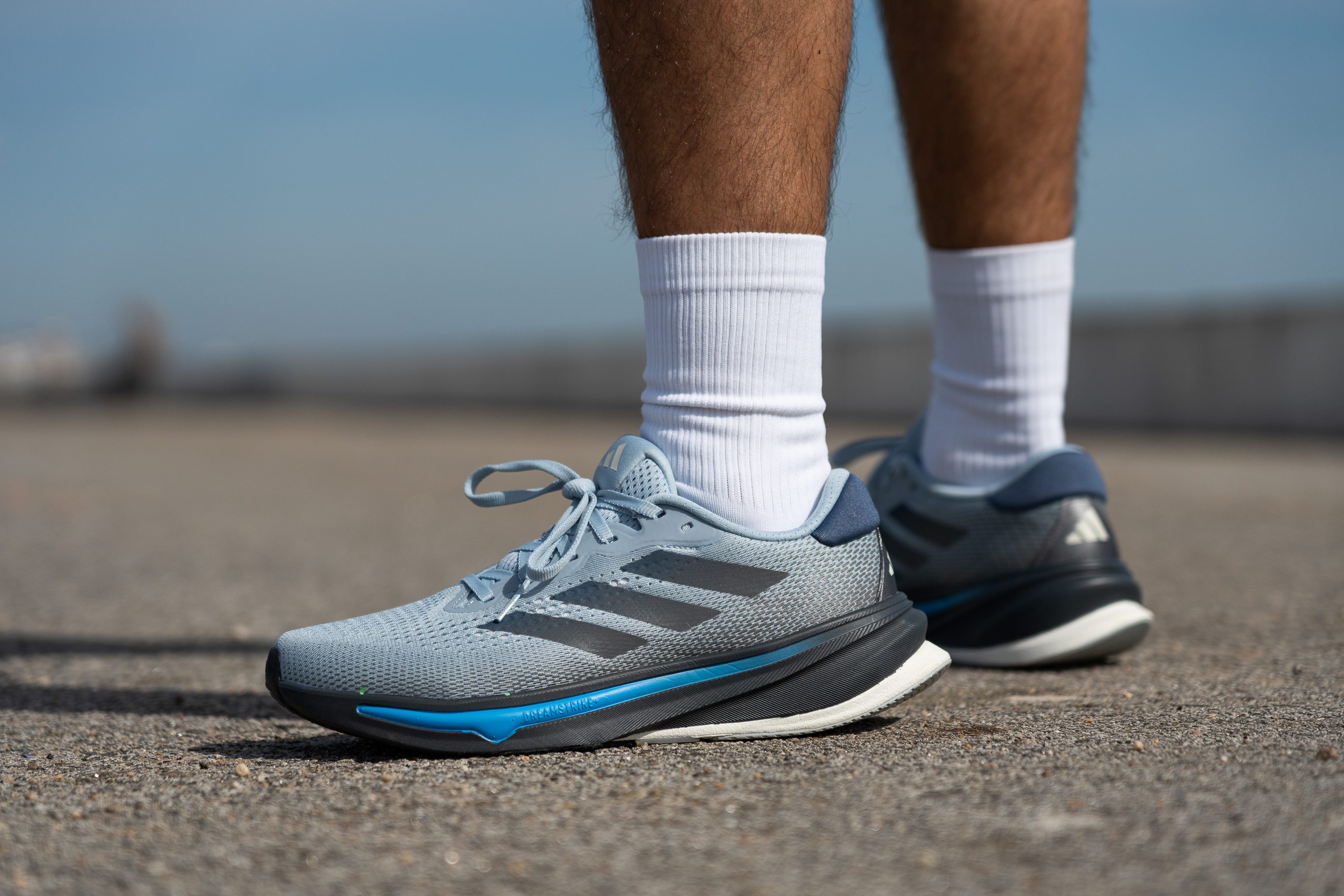
Who should NOT buy
While the Supernova Rise from Adidas stands out as a competent daily trainer, we do not recommend it for every runner. Specifically, if you're in pursuit of a modern, maximalist running shoe, the Rise falls short on cushioning. In such cases, we found the ASICS Novablast 4, within a similar price range, or the ASICS Superblast, if budget allows, to be better options.
Moreover, we believe the Supernova Rise is not the best fit for midfoot and forefoot strikers due to its drop and cushioning. For these runners, we think a more balanced shoe like the Saucony Ride 17 might offer an improved experience, catering more effectively to their needs.
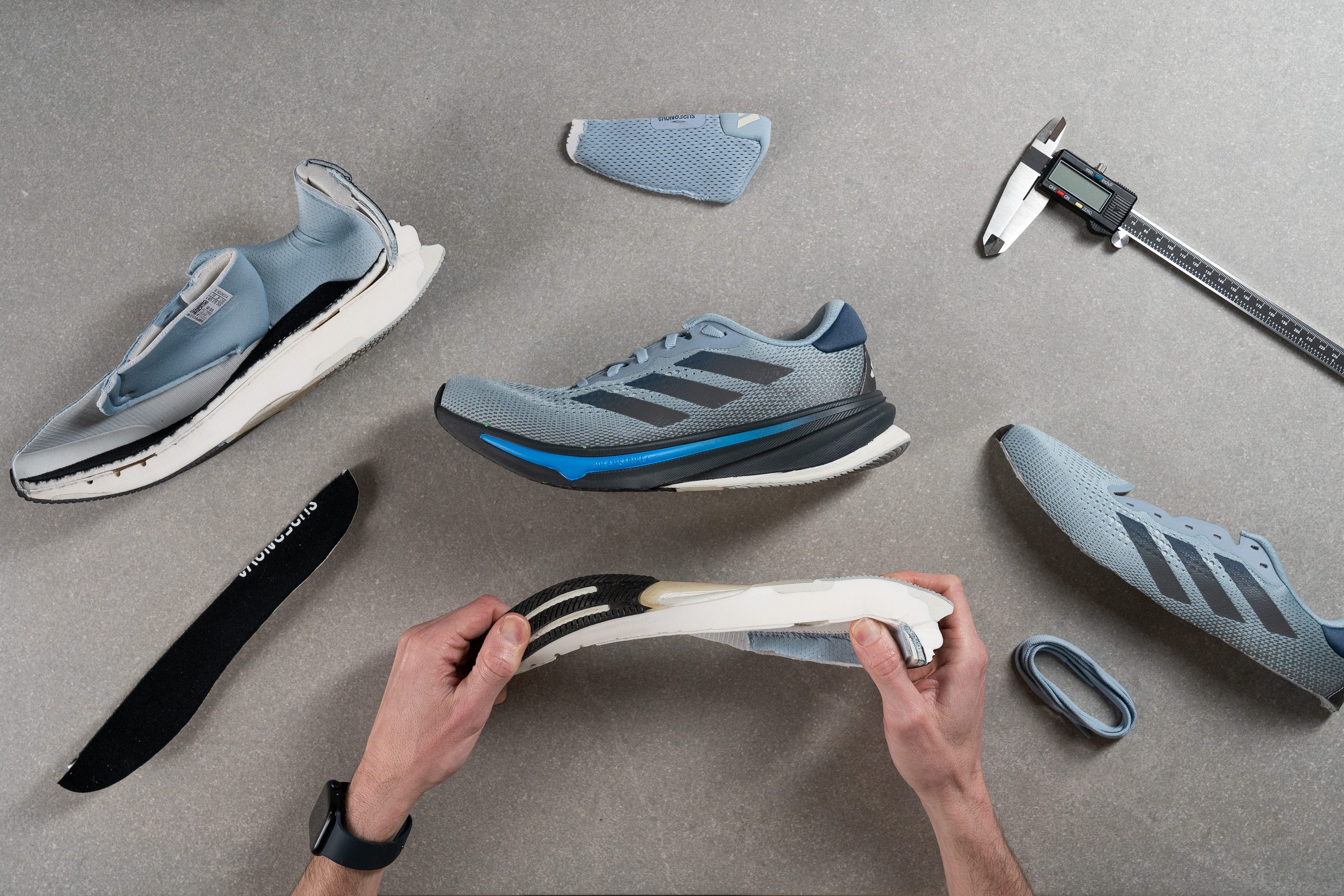
Cushioning
Shock absorption
The Supernova Rise offers moderate cushioning, with 121 SA in the heel and 92 SA in the forefoot. This setup reflects Adidas’ usual design approach, prioritizing a lower-profile forefoot in many of their daily trainers, something we confirmed using the ASTM F1976 standard.
To put it another way, heel strikers will enjoy a standard, comfortable ride, while forefoot strikers should expect a more ground-connected experience compared to many competitors.
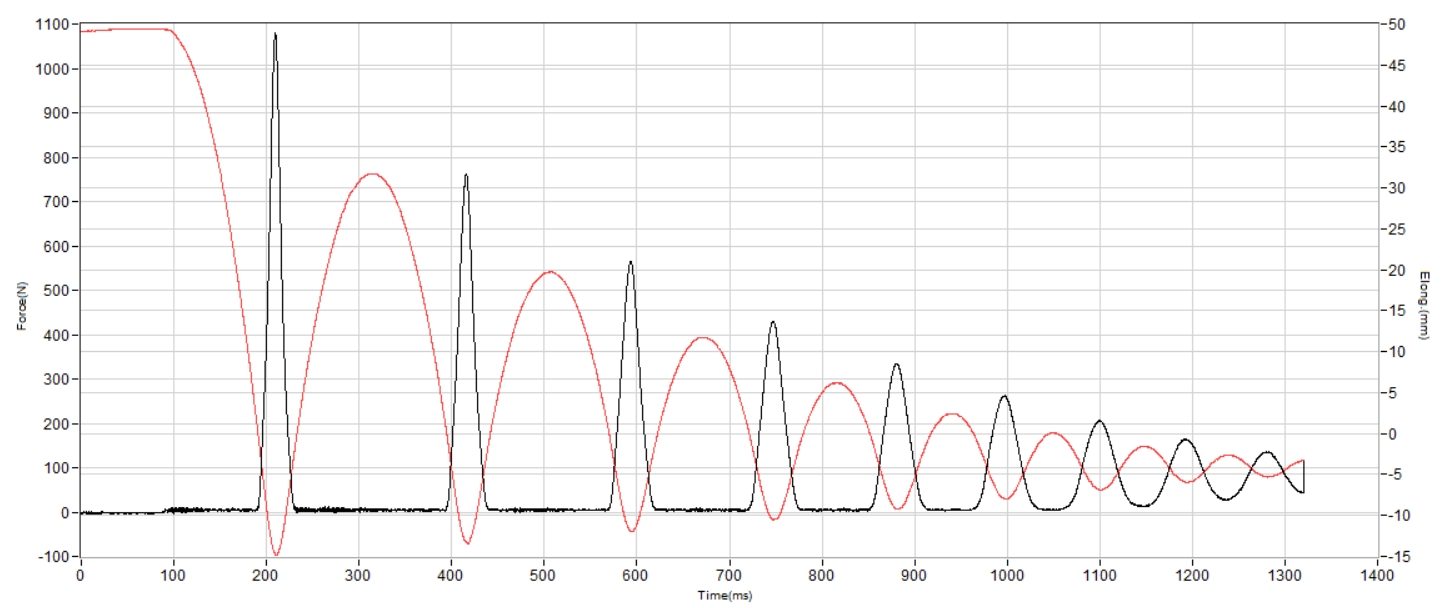
| Supernova Rise | 121 SA |
| Average | 130 SA |
Energy return
The new PEBA-based Dreamstrike+ foam in the Supernova Rise is simply outstanding—we tested it and couldn’t be more impressed. With 71.2% energy return, it beats most running shoes on the market and edges closer to super shoe territory.
We’ve waited a long time for Adidas to bring a premium, high-bounce compound to training shoes (Light Boost aside), and they finally nailed it.
| Supernova Rise | 71.2% |
| Average | 58.6% |
Heel stack
The Supernova series remains steadfast as a non-maximalist trainer, a trend it proudly continues despite most brands going higher and higher.
We measured the heel at 32.5 mm—ample cushioning for heel strikers, particularly since the foam isn't overly soft, a detail we'll delve into shortly.
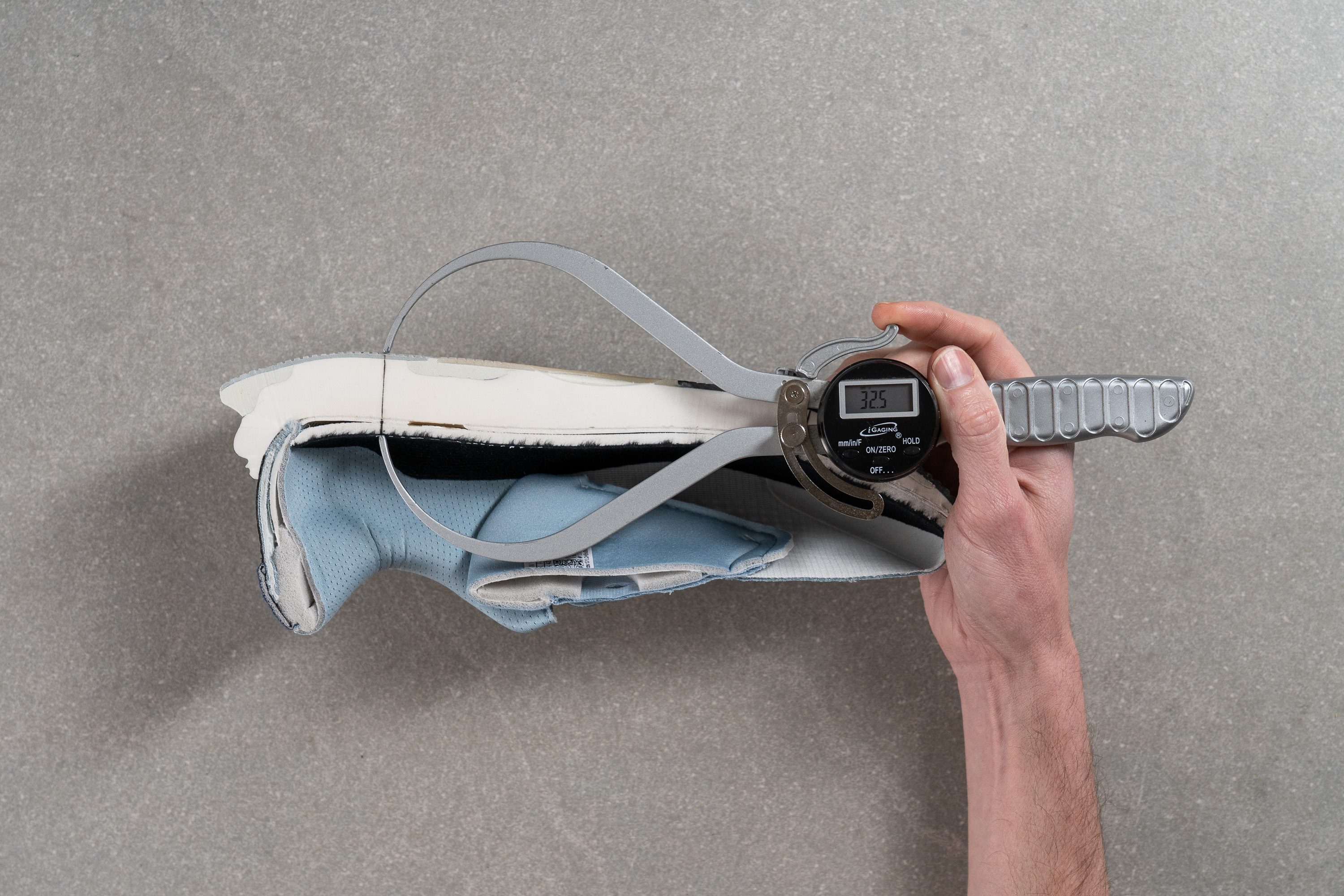
| Supernova Rise | 32.5 mm |
| Average | 34.8 mm |
Forefoot stack
In the forefoot, we measured a modest 22.8 mm of foam, which might not sound like much—and it feels just as lean.
From our experience, the Supernova Rise performs admirably for midfoot and forefoot strikers on anything less than 10 miles. However, we'd hesitate to recommend it for long runs if you're a forefoot striker. For such distances, a shoe with more cushioning, like the Brooks Ghost Max, might be a more suitable option.
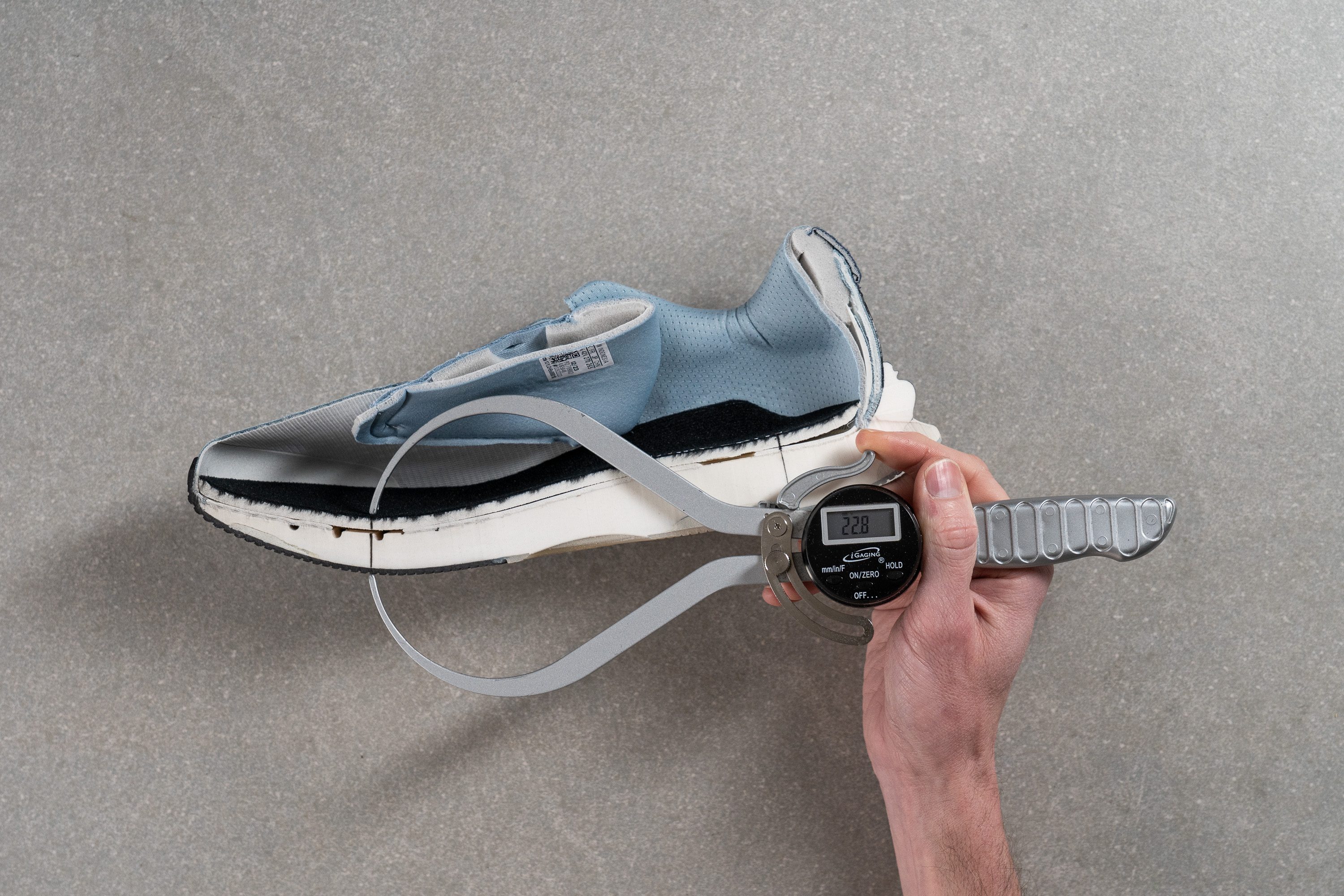
| Supernova Rise | 22.8 mm |
| Average | 26.2 mm |
Drop
Adidas has a reputation for creating daily trainers with a significant heel-to-toe drop, and the stated 10 mm drop of this model seemed to confirm that. Our own measurements revealed a real drop of 9.7 mm, remarkably close to the official figure.
This pronounced drop, especially when paired with the thin cushioning in the forefoot, unmistakably makes the shoe a choice for heel strikers above all.
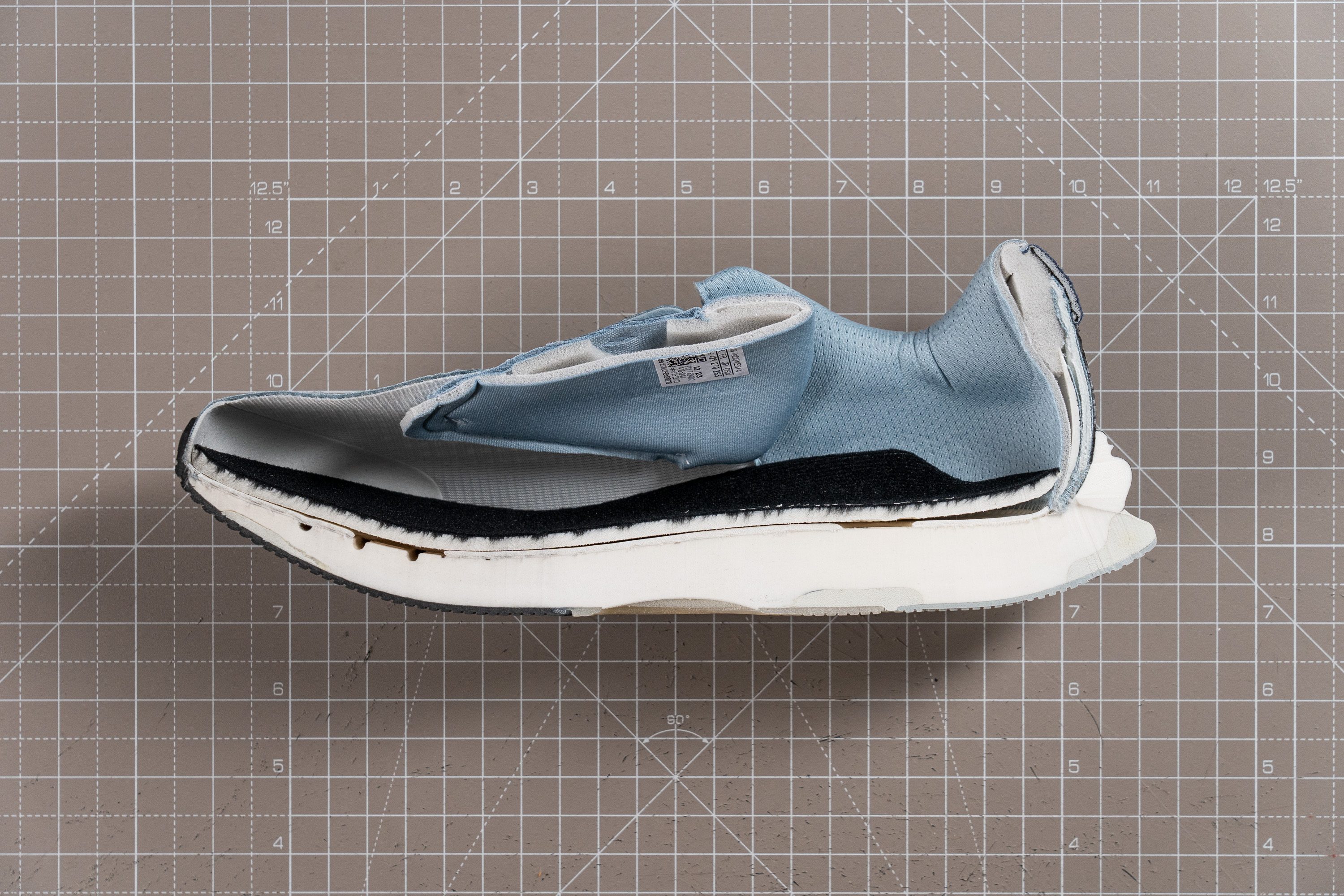
| Supernova Rise | 9.7 mm |
| Average | 8.6 mm |
Midsole softness
UpdatedThe midsole introduces a significant update with the new Dreamstrike+ foam. We recorded 35.0 AC on the durometer, which results in a ride that's both balanced and comfortable, though not overly plush.
Additionally, the shoe incorporates what Adidas dubs "Support Rods," akin to the Energy Rods in their premium racers like the Adidas Adizero Adios Pro 3.
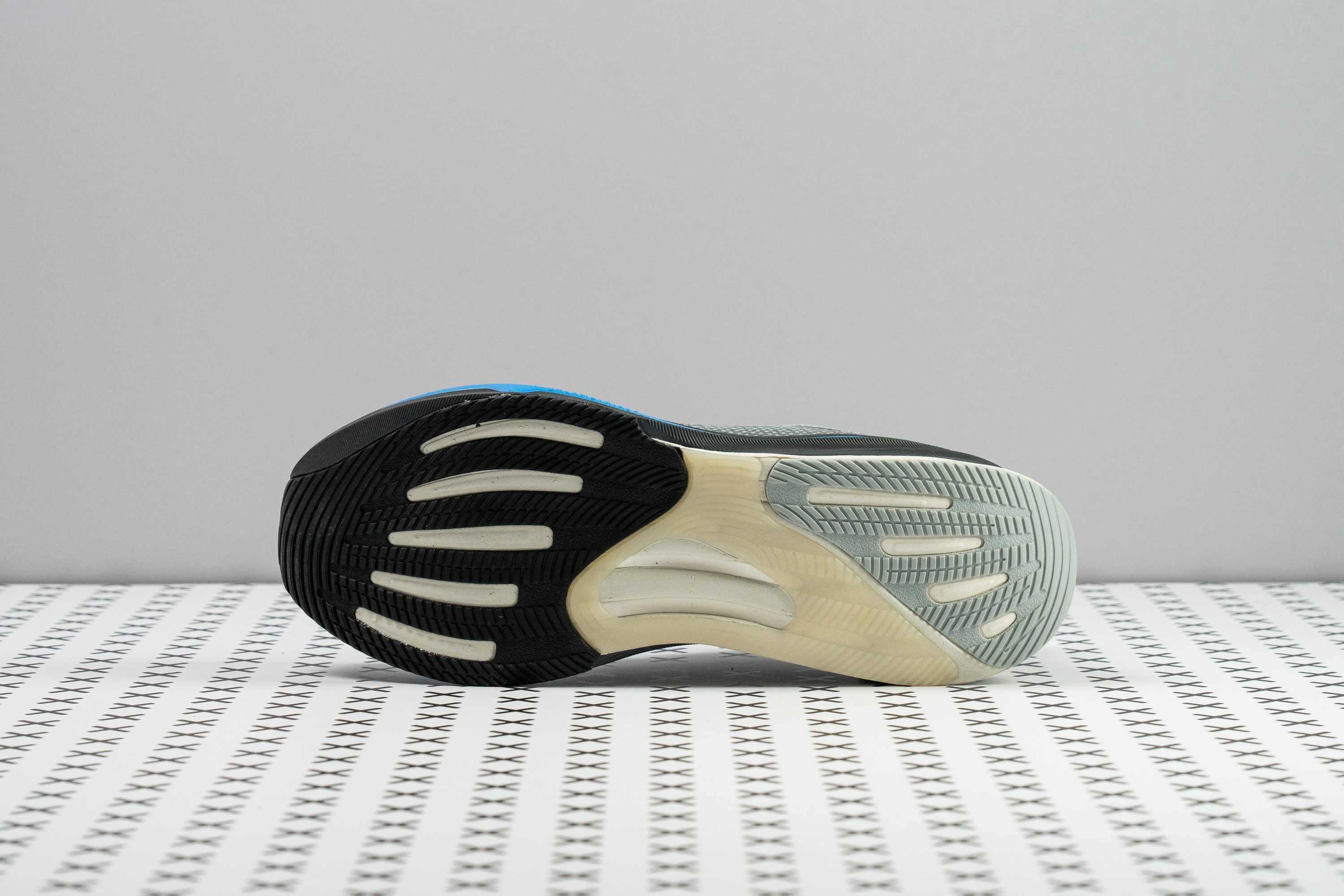
These rods, made from an EVA carrier foam, enhance both stability and durability, safeguarding the PEBA foam.
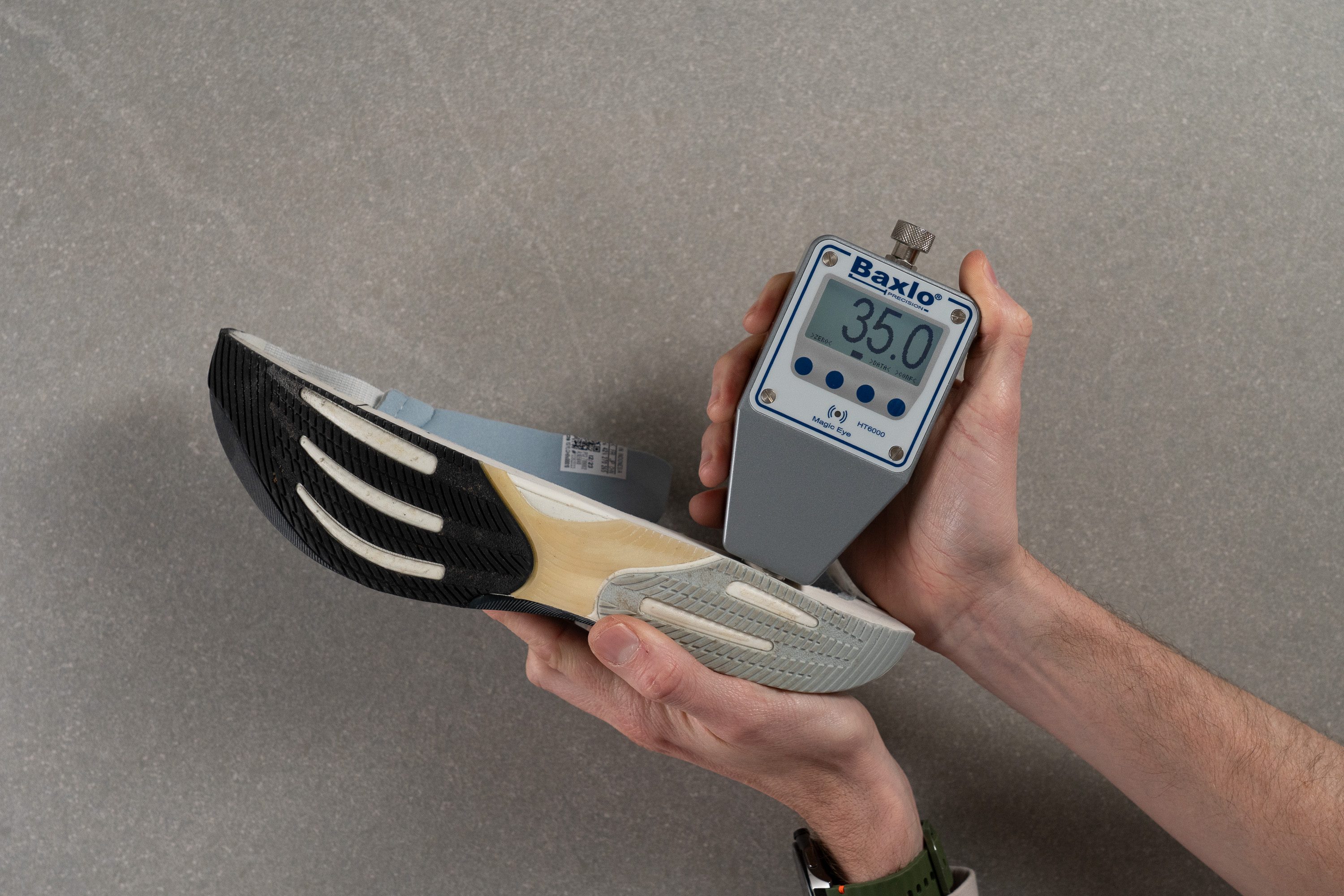
| Supernova Rise | 35.0 AC |
| Average | 36.3 AC |
Secondary foam
UpdatedWe measured the softness of the Support Rods at 50.0 AC, an ultra-firm reading for any midsole foam.
While this is fully expected given their stability-focused role, this dense, control-oriented compound noticeably influences the underfoot feel and makes the shoe ride slightly firmer than what the primary foam’s Asker C measurement alone would suggest.
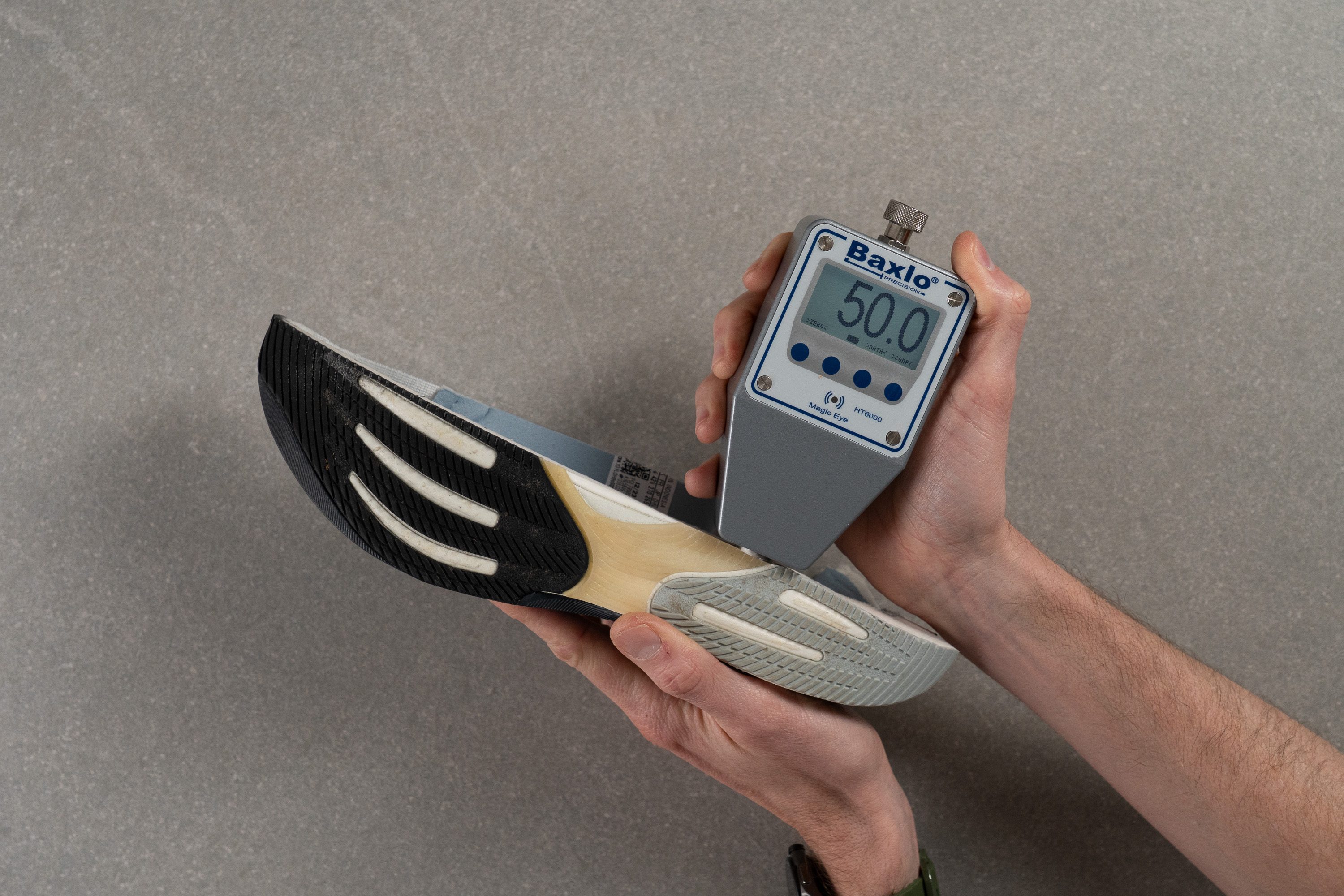
| Supernova Rise | 50.0 AC |
| Average | 39.1 AC |
Rocker
We didn't anticipate Adidas introducing a pronounced rocker design in the Supernova series, yet they have in the Rise. It appears to us that a significant number of runners today prefer a nice rocker in their running shoes, prompting Adidas to adopt this trend even in their everyday trainers.
Compared to previous models, the ride features a mild rocker in the forefoot, yet marking it for us as a notably rockered Supernova. This design enhances transitions for heel strikers, offering a considerable advantage to those who often find themselves restricted by flatter geometries.
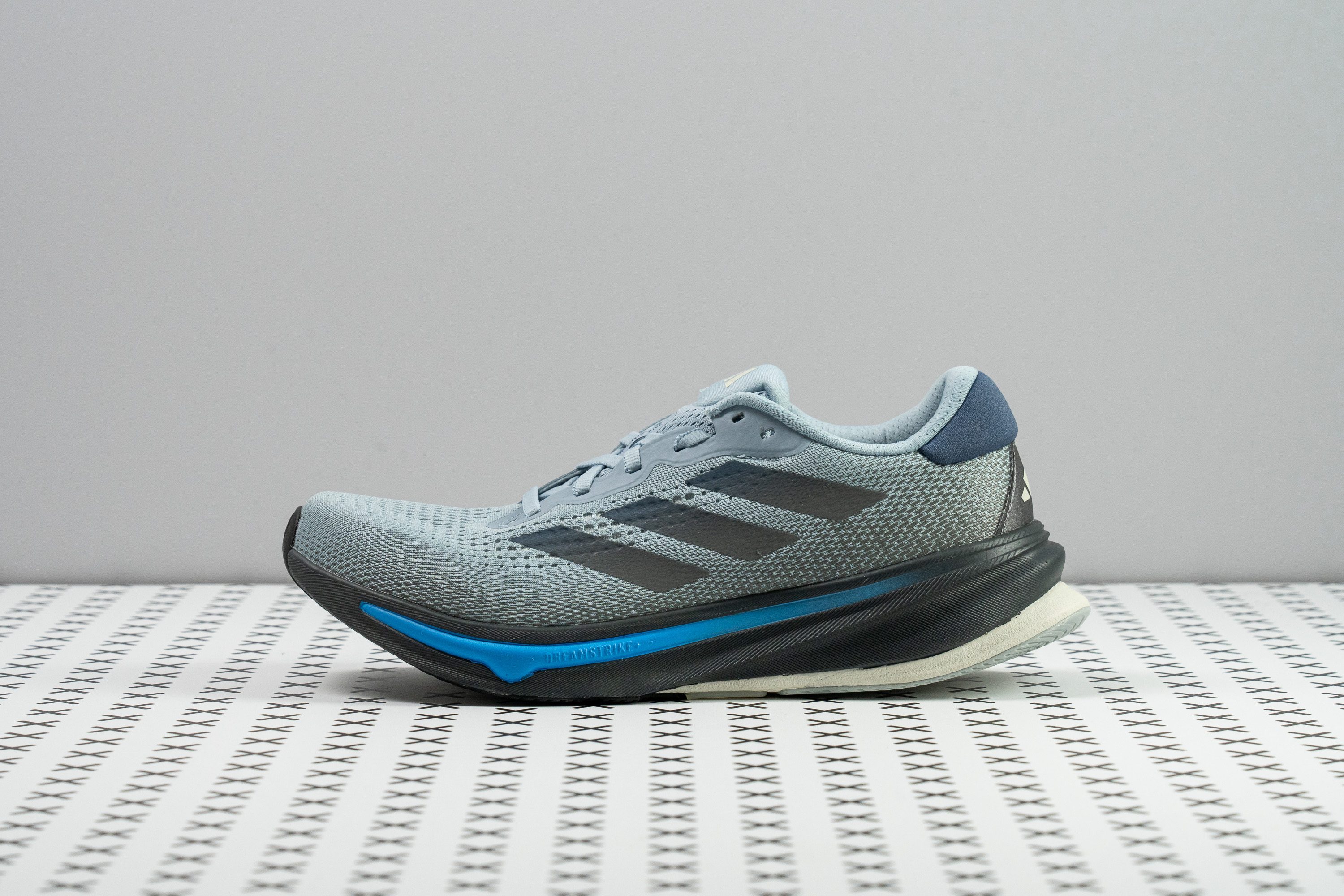
Size and fit
Size
Adidas Supernova Rise fits slightly small (137 votes).
Internal length
| Supernova Rise | 269.3 mm |
| Average | 269.4 mm |
Width / Fit
From the get-go, the Rise felt spacious, sparking our curiosity and prompting us to create a custom gel cast of its interiors.
Afterward, our calipers confirmed a generously roomy design at 99.0 mm, making it an excellent choice for those with slightly wider feet.
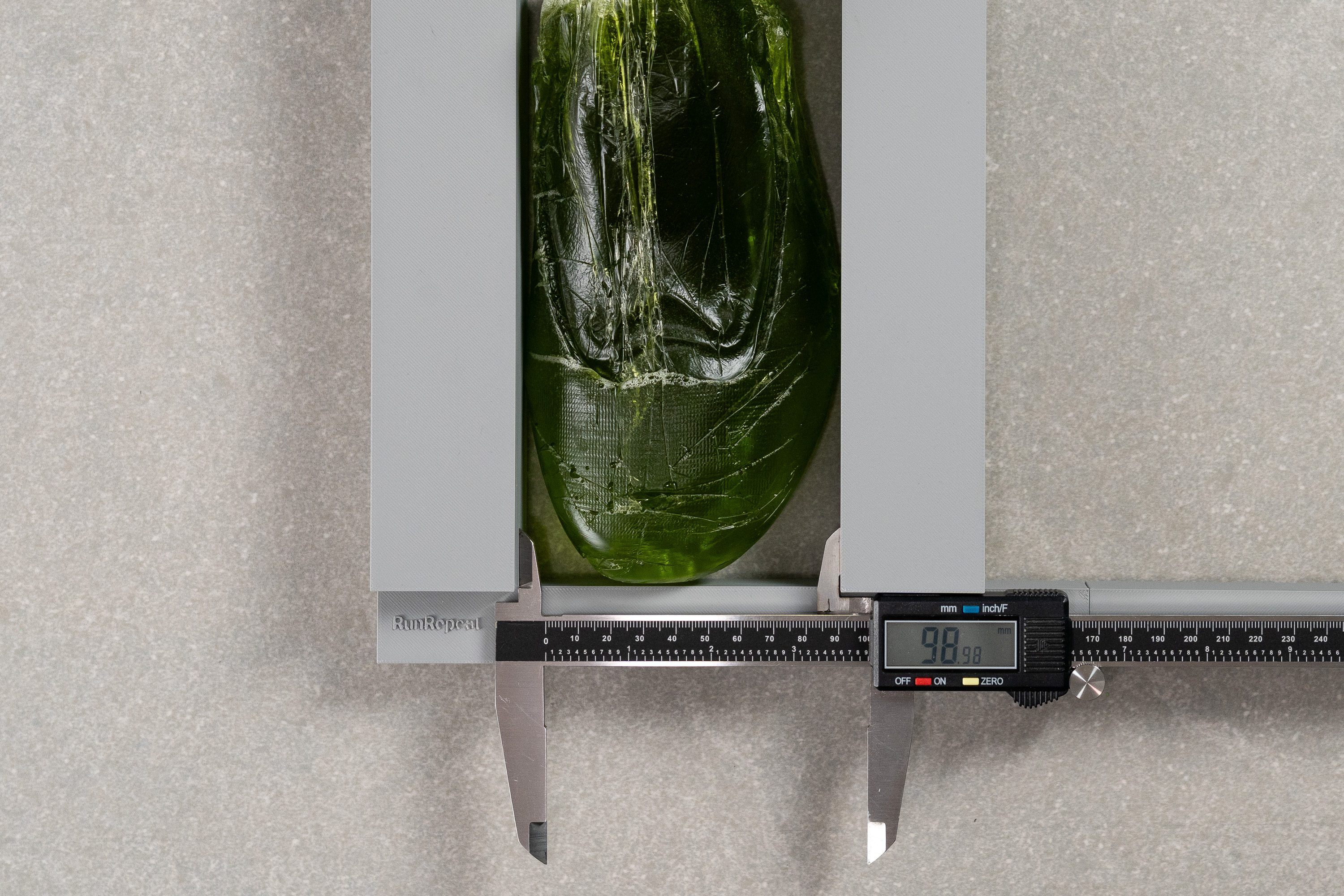
| Supernova Rise | 99.0 mm |
| Average | 95.2 mm |
Toebox width
The big toe area truly reveals the essence of this wide toebox, highlighting why taking multiple measurements is crucial. We found it to be a spacious 76.5 mm, which is remarkably roomier than most competitors.
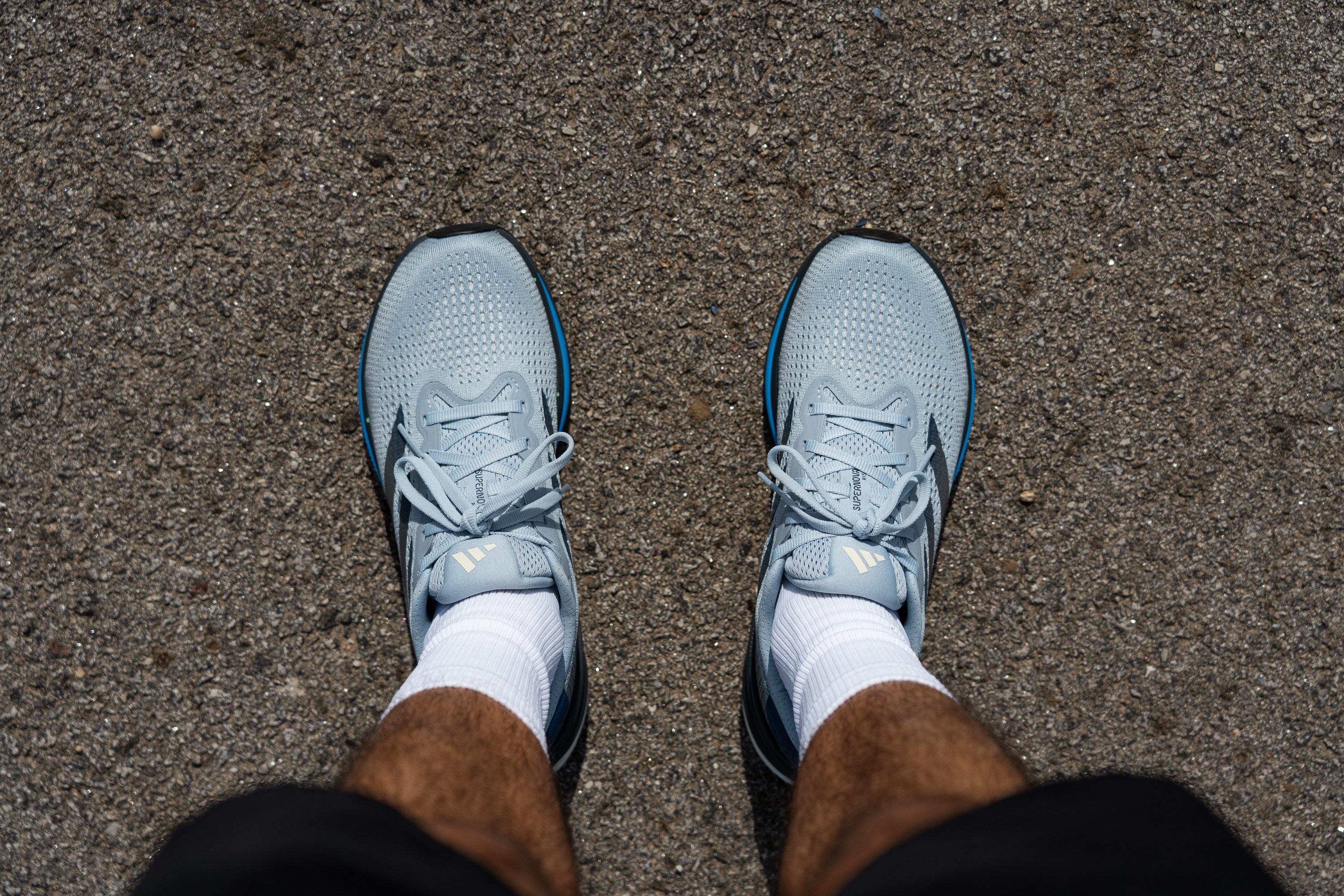
For those with square-shaped feet, this shoe is a godsend. The toebox offers ample space up front, ensuring that no matter the heat or how much your feet might swell, there will always be enough room to accommodate them comfortably.
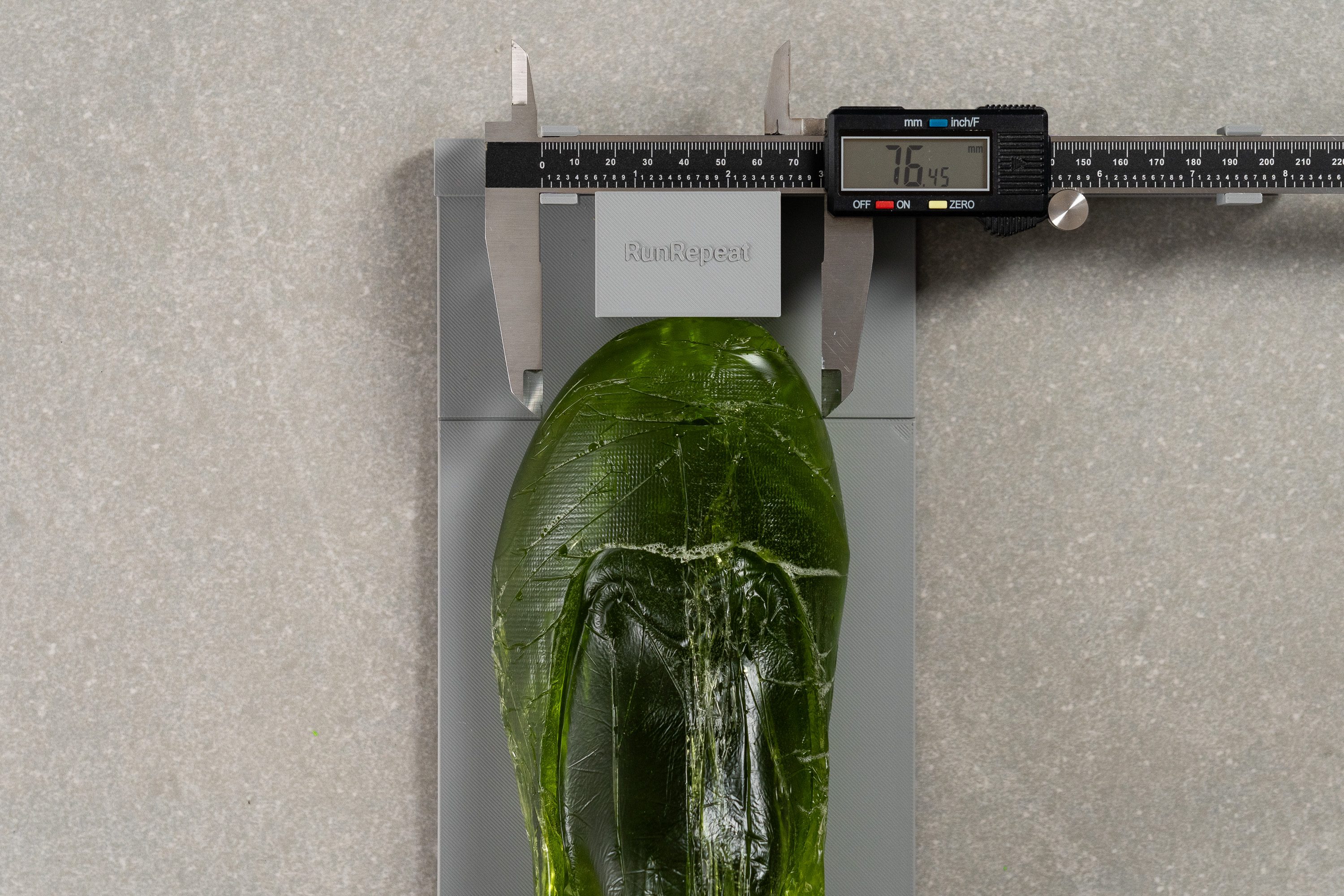
| Supernova Rise | 76.5 mm |
| Average | 73.3 mm |
Toebox height
After our third measurement of 29.7 mm, we can confidently say that the Supernova Rise features a high-volume upper, both in width and height.
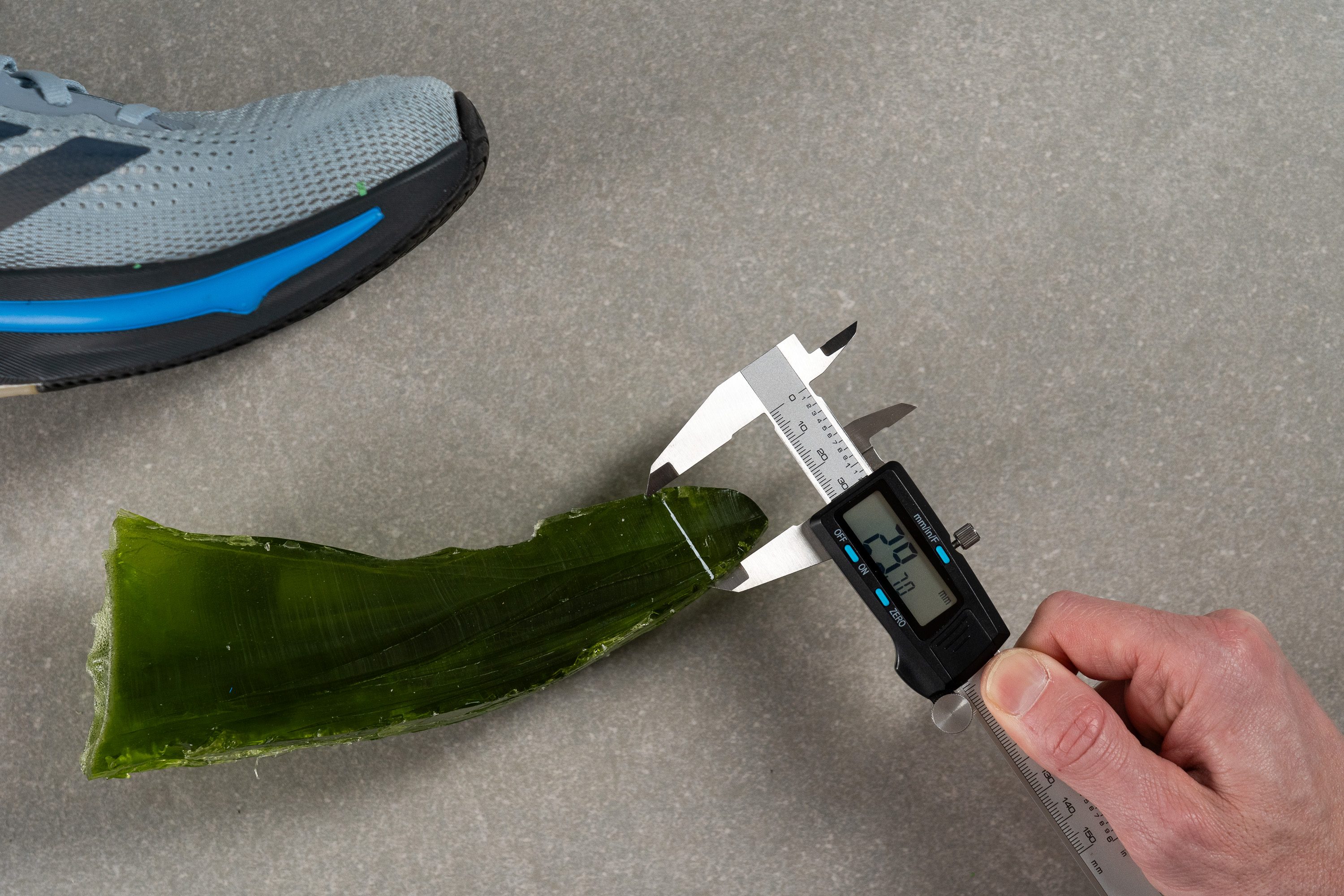
| Supernova Rise | 29.7 mm |
| Average | 27.1 mm |
Traction / Grip
Traction test
The absence of Continental rubber in the Supernova Rise is likely a cost-saving move.
While it still delivered an above-average 0.58 in our wet grip test, that’s below what we typically see in Continental-equipped Adidas models like the Prime X 2 Strung. In short: grip is solid on both dry and wet surfaces, but not world-class.
| Supernova Rise | 0.58 |
| Average | 0.49 |
Outsole design
Adidas added multiple cutouts to boost flexibility and reduce weight, improving the shoe’s overall performance. We also found two distinct rubber compounds—Adiwear in the forefoot and heel, and a traslucent rubber in the midfoot for added flex and weight savings.
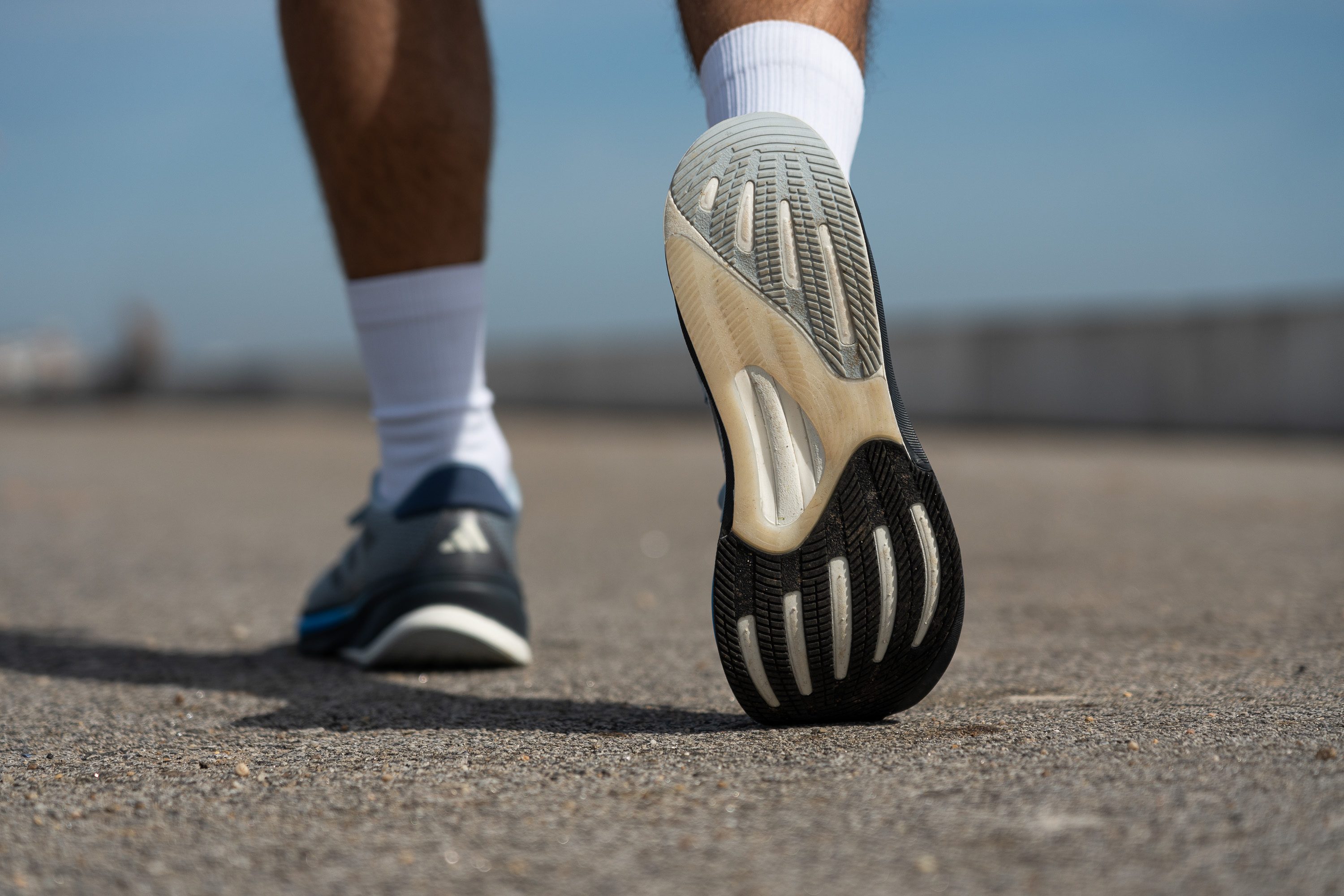
Flexibility / Stiffness
We've already established that the torsional rigidity of the Supernova Rise is quite minimal. So, how does it fare in terms of torsional stiffness?
In our bending test, where we flexed the shoe to 30 degrees, it demonstrated good flexibility, requiring only 11.2N of force. This is fantastic for those who value a natural feel underfoot, and for everyday wear.
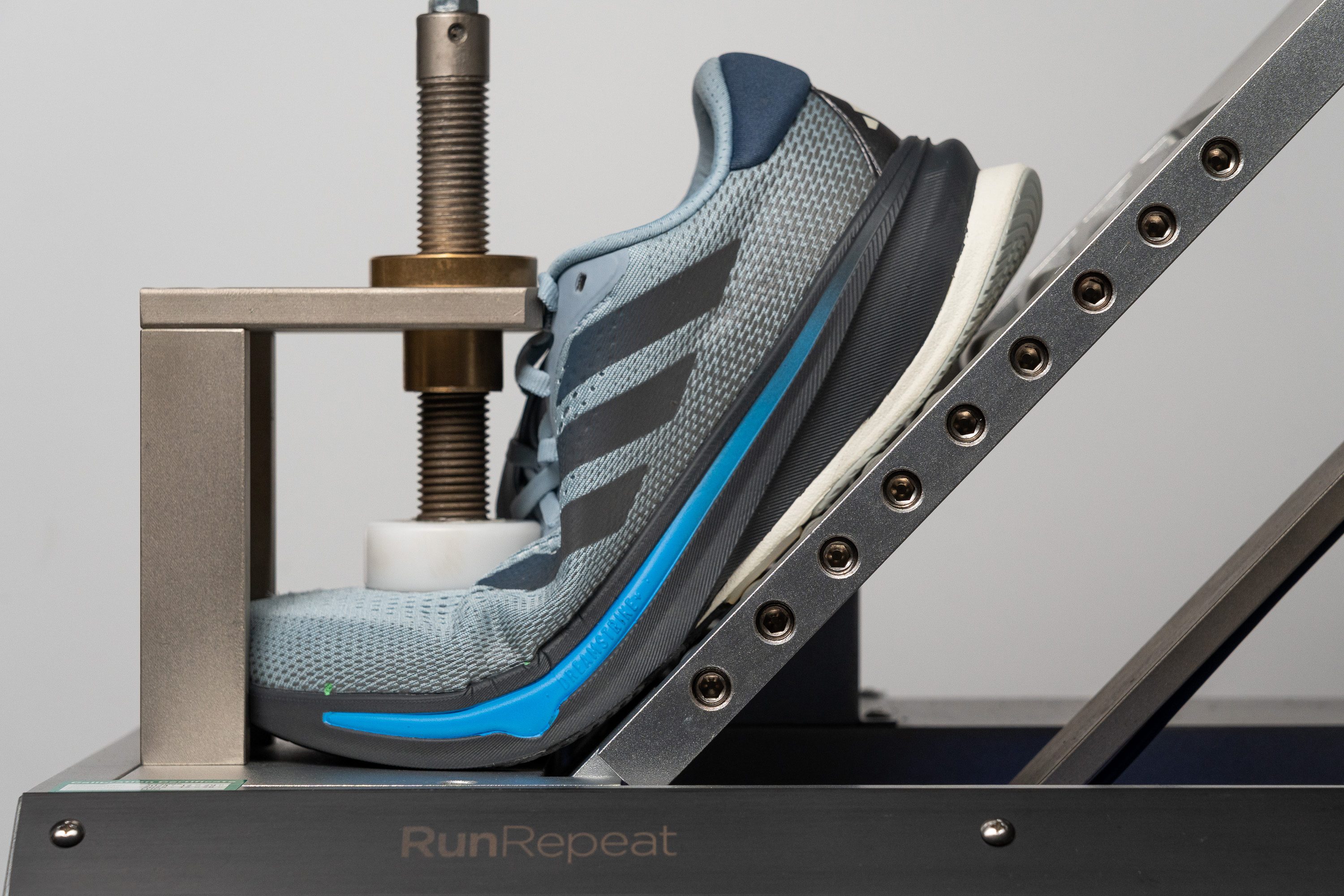
| Supernova Rise | 11.2N |
| Average | 15.3N |
Weight
Remarkably, the Supernova Rise tips the scales at just 9.8 oz (278g), an nice figure for an Adidas daily trainer that comfortably keeps it under the 10-oz mark.
The secret to its lightness primarily lies in the midsole. Adidas transitioned from the once-revolutionary Boost—by 2013 a real game-changer but now dated and notably heavy—to Dreamstrike+, a featherlight PEBA foam. This shift is key to achieving a more nimble construction.
Yet, despite these advancements, it doesn't quite reach the featherweight status of some other daily trainers like the Hoka Clifton 9. The shoe just strikes a balance, not feeling overly heavy nor particularly light.
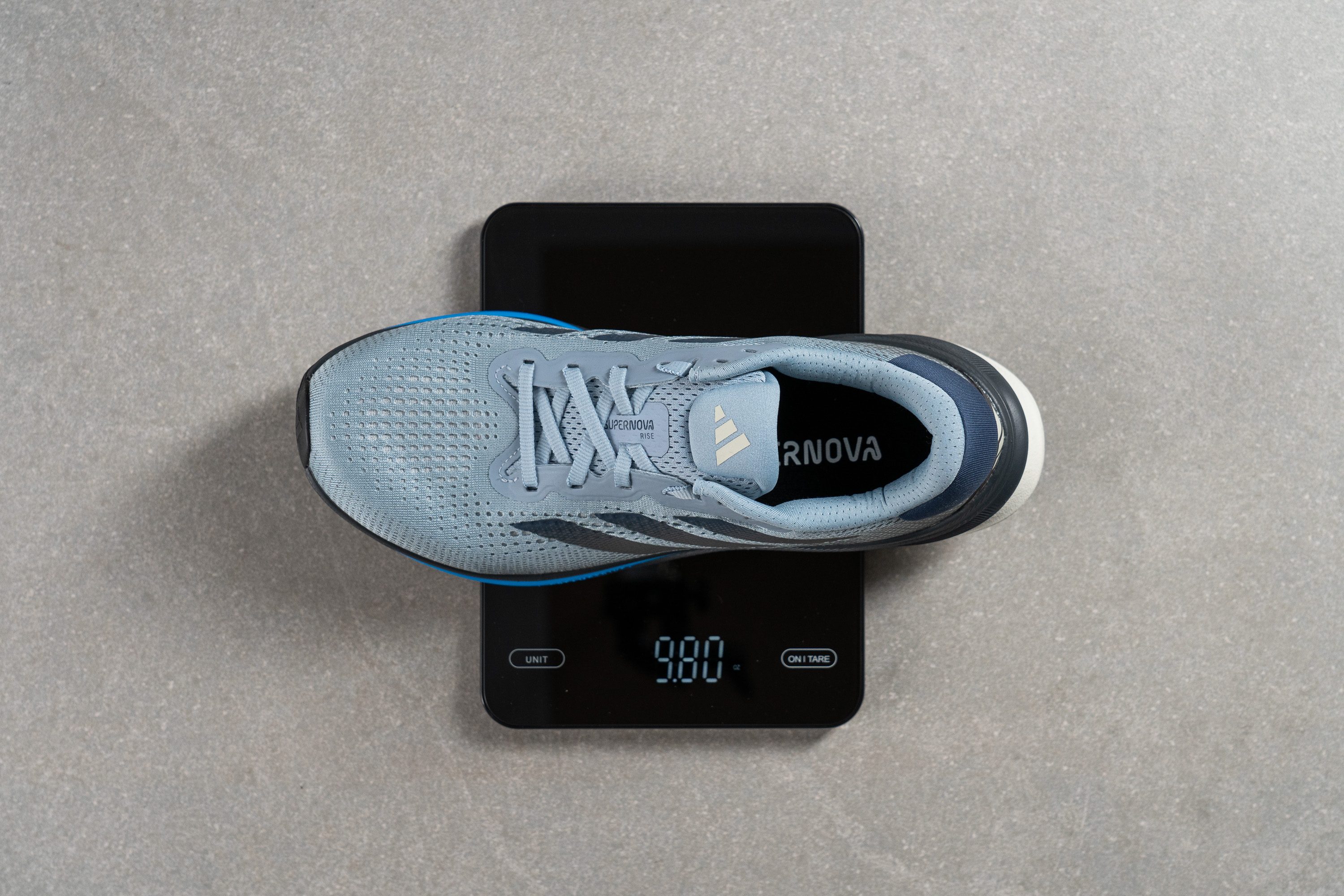
| Supernova Rise | 9.8 oz (278g) |
| Average | 9.3 oz (264g) |
Breathability
The Supernova Rise caught our attention with its abundant ventilation holes, leaving us eager to test their functionality beyond mere aesthetics.
Thankfully, our first test with the smoke-pumping machine confirmed that Adidas designed these holes with purpose—they effectively facilitate air and moisture evacuation, crucial for comfort during warm runs, earning a solid 4/5 from us.
Shining a light through the upper is a simple yet revealing test, showcasing a well-ventilated toebox and medial areas, contrasted by a denser, structured heel. Smart!
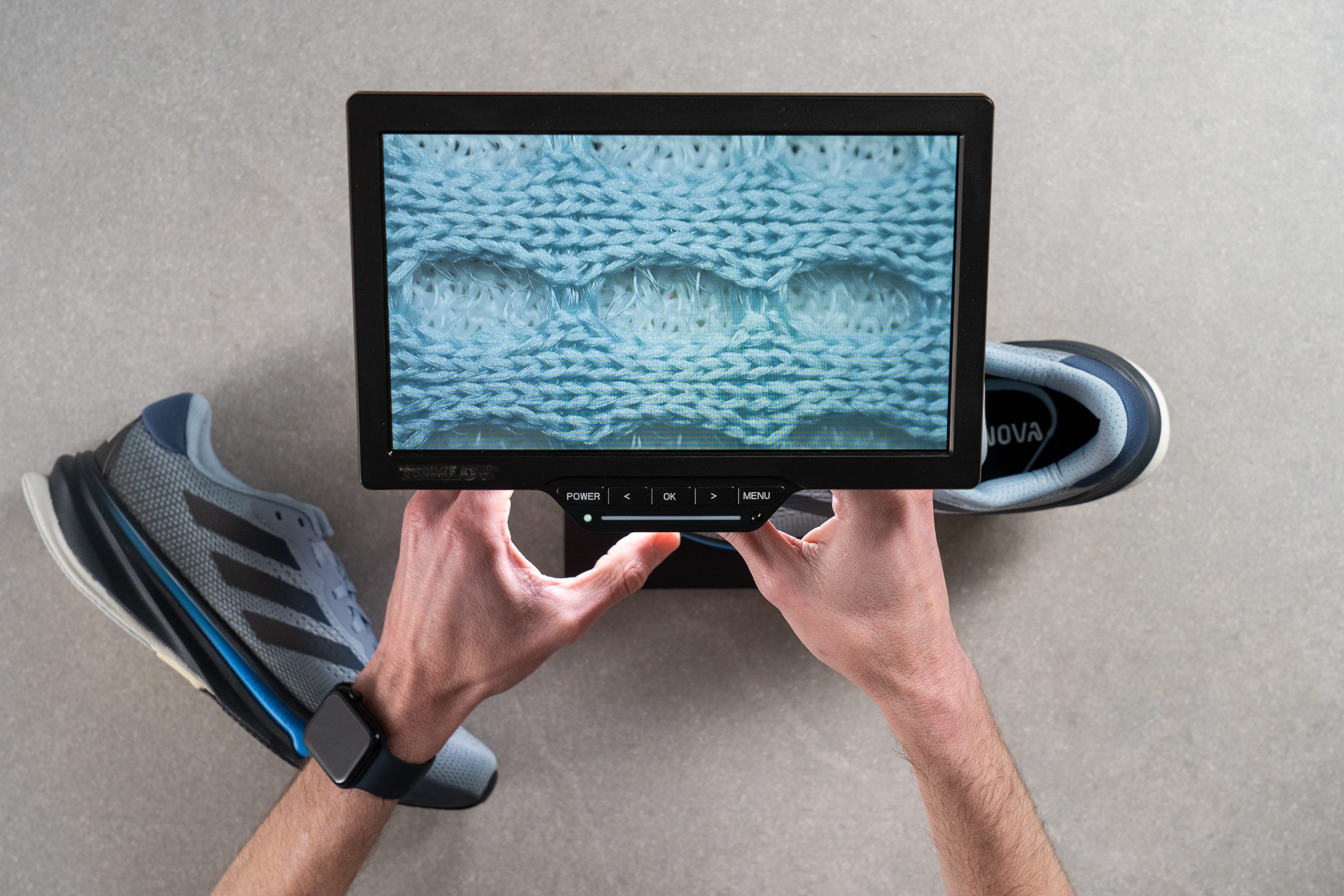
Delving deeper with our microscope, we got an up-close look at the ventilation holes, which impressed us despite the sandwiched mesh slightly obstructing airflow.
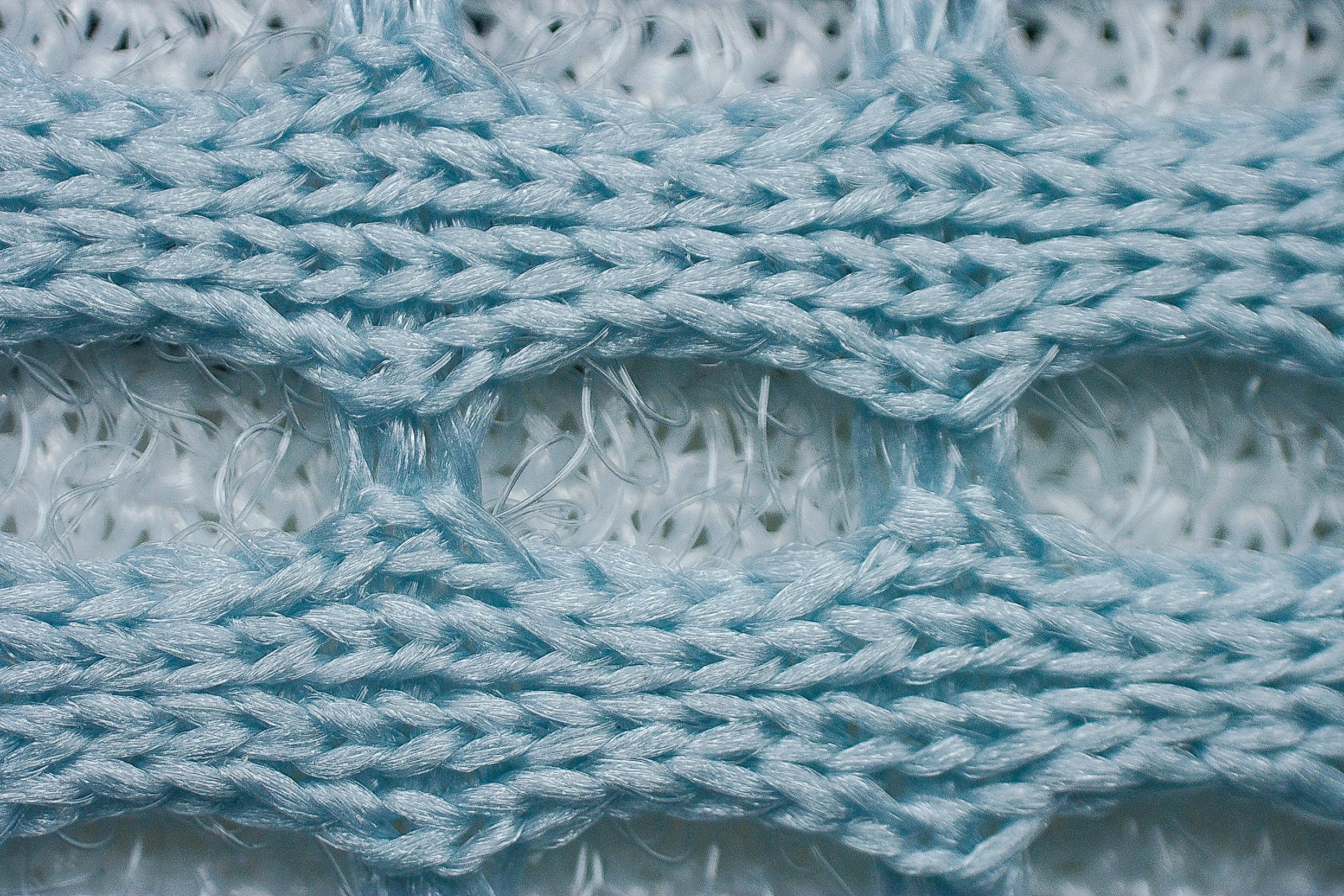
Yet, this isn't a drawback. In a daily trainer, a 4/5 ventilation score strikes a perfect balance, offering ample breathability for summer while retaining enough warmth for cooler runs.
Upon examining the sliced upper in detail, we were pleased to find exceptional padding in the tongue and heel, with quality that surpassed our expectations for a mid-tier, $140 shoe.
| Supernova Rise | 4 |
| Average | 3.7 |
Stability
Lateral stability test
Regarding stability, although designed as a neutral shoe, this shoe impressed us with exceptional support during our test runs.
This stability likely stems from a harmonious blend of balanced foam, a significant heel bevel, and the Support Rods.
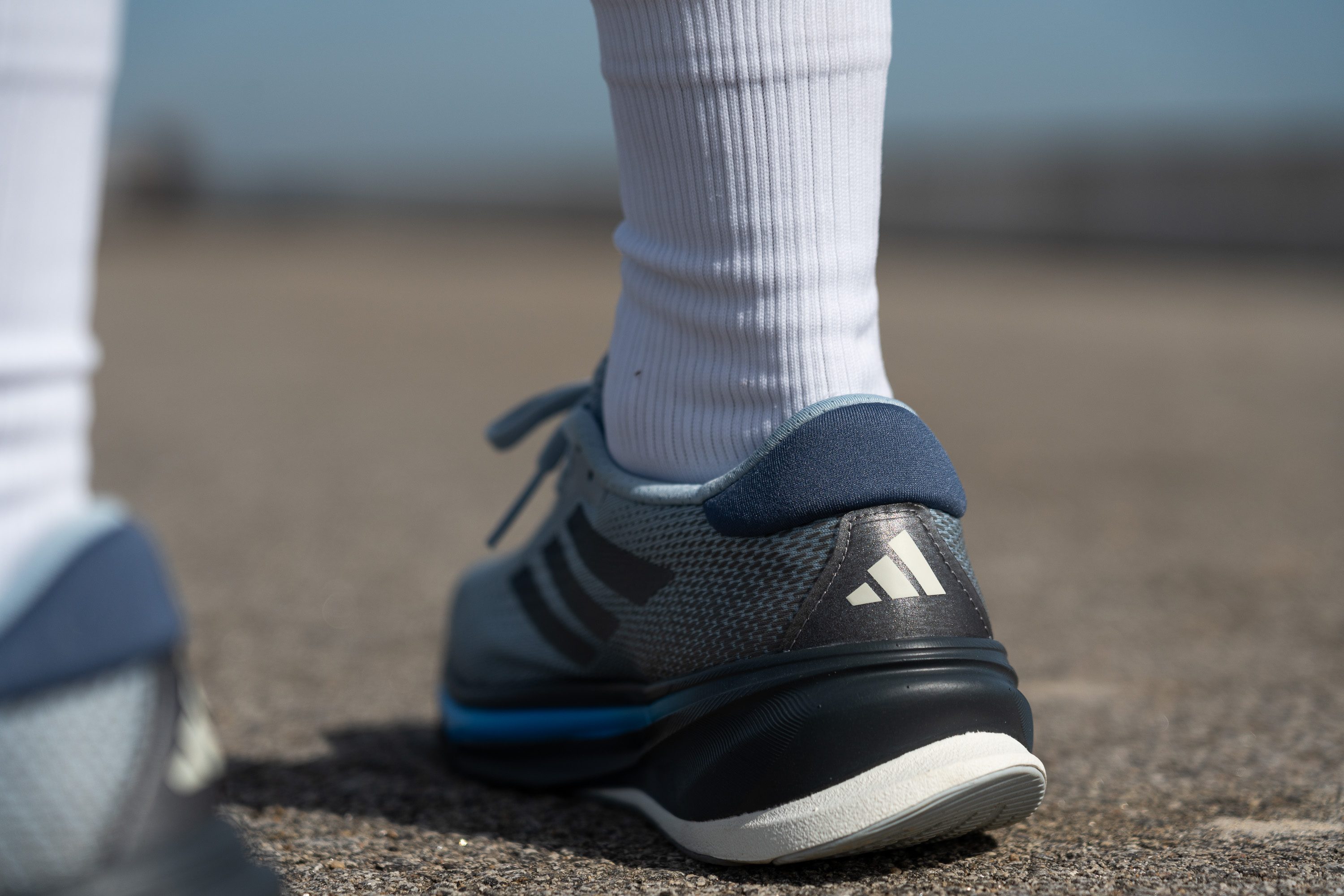
Yet, there seems to be more contributing to its solid performance—let's delve deeper to uncover the reasons.
Torsional rigidity
The Supernova series is known for its exceptional torsional flexibility, rendering this shoe perfectly suitable for a wide range of activities—from walking the dog to attending gym classes.
This versatility remains evident in our hands-on evaluation, where it achieved a solid 2/5 rating.
| Supernova Rise | 2 |
| Average | 3.5 |
Heel counter stiffness
Adidas truly focused on stability, as previously mentioned, by engineering an exceptionally rigid heel counter, which we awarded a max 5/5 rating.
The rationale behind this design choice is straightforward—the shoe is tailored for heel strikers, aiming to enhance their running experience with superior stability despite being a neutral shoe.
Thus, it seems that the guys from Herzo deemed it worthwhile to slightly compromise heel comfort, particularly for those with Achilles issues, in exchange for significant gains in stability.
| Supernova Rise | 5 |
| Average | 2.9 |
Midsole width - forefoot
Upon measuring the actual dimensions of the shoe, we were taken aback—the shoe presents and feels larger than our measurements suggest, especially given its stability.
In the forefoot, it measures just 112.8 mm, which is fairly standard.
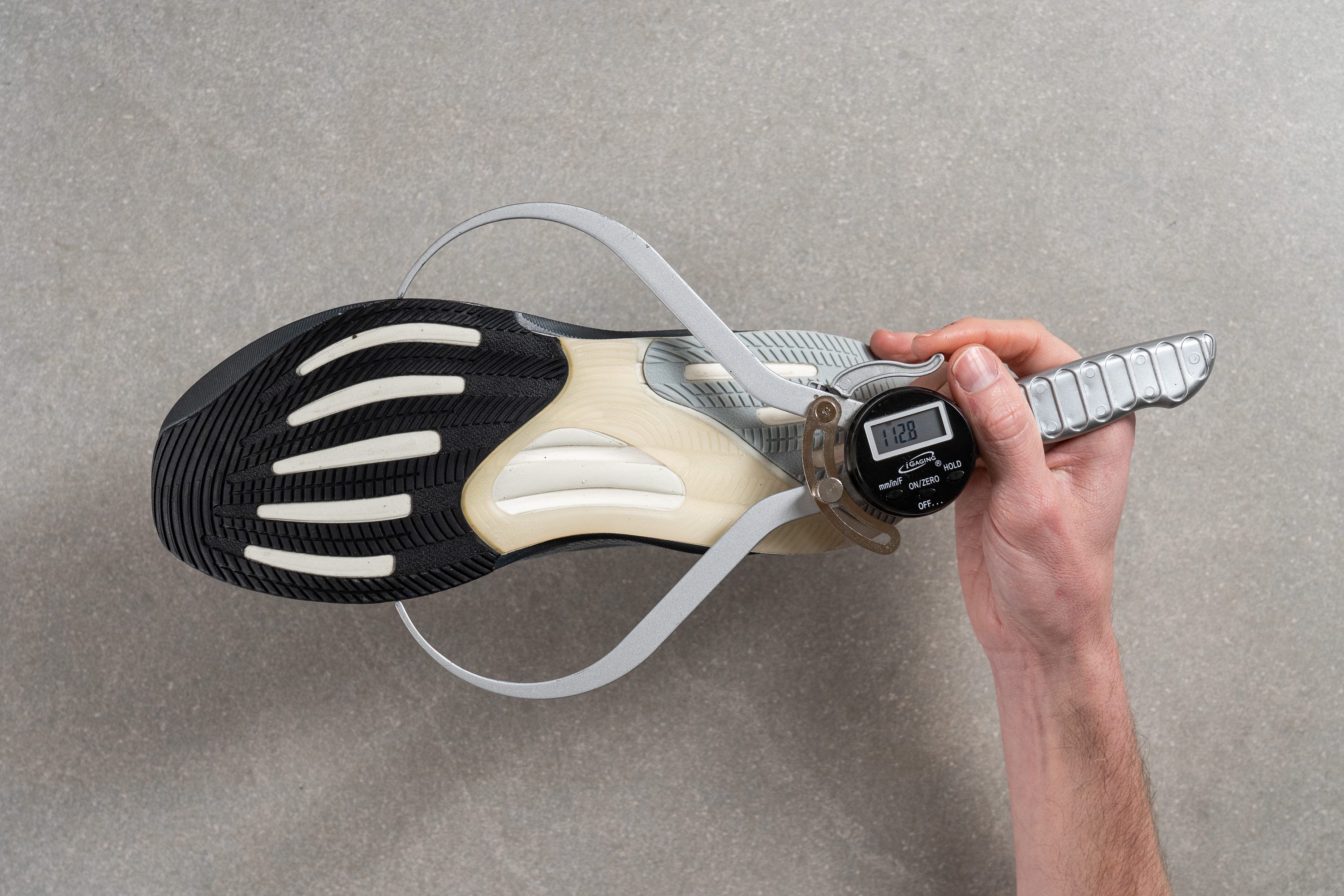
| Supernova Rise | 112.8 mm |
| Average | 114.4 mm |
Midsole width - heel
In the heel, our surprise deepened when we discovered a width of merely 86.4 mm—quite narrow indeed.
We believe that Adidas could enhance even more the shoe's stability in future iterations by modestly widening the heel, while still maintaining its agility by not overdoing it.
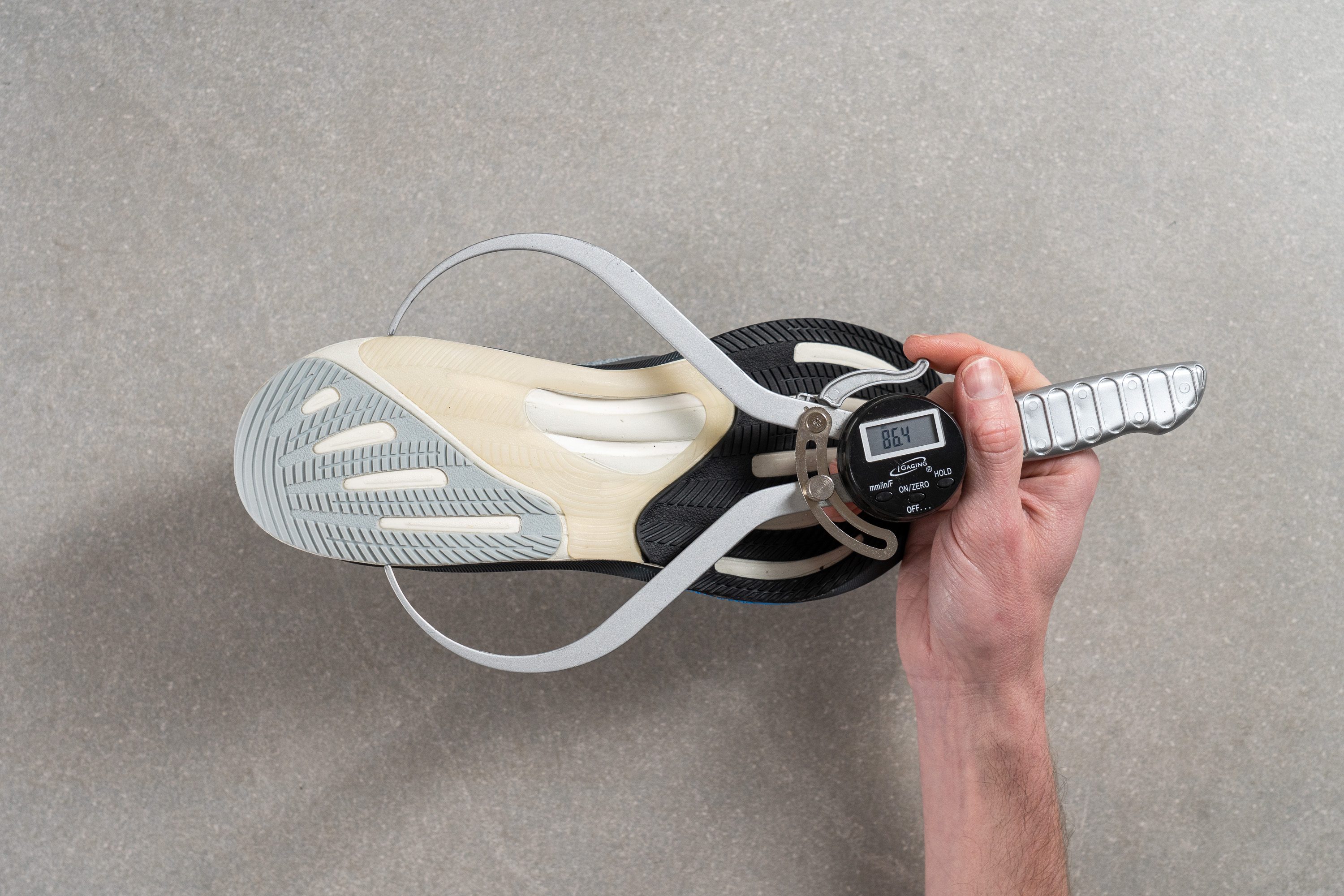
| Supernova Rise | 86.4 mm |
| Average | 90.6 mm |
Durability
Toebox durability
In our lab, we're often cautious about predicting durability scores for shoes with extensive ventilation holes. However, Adidas' reputation for creating long-lasting footwear gave us hope for a positive outcome here.
Putting the shoe to the test with our Dremel at 5K RPM and a force of 3.2N, we observed some damage, but it was less severe than anticipated. The result—a satisfactory 3/5—revealed the white layer beneath, previously shown in our microscopic analysis.
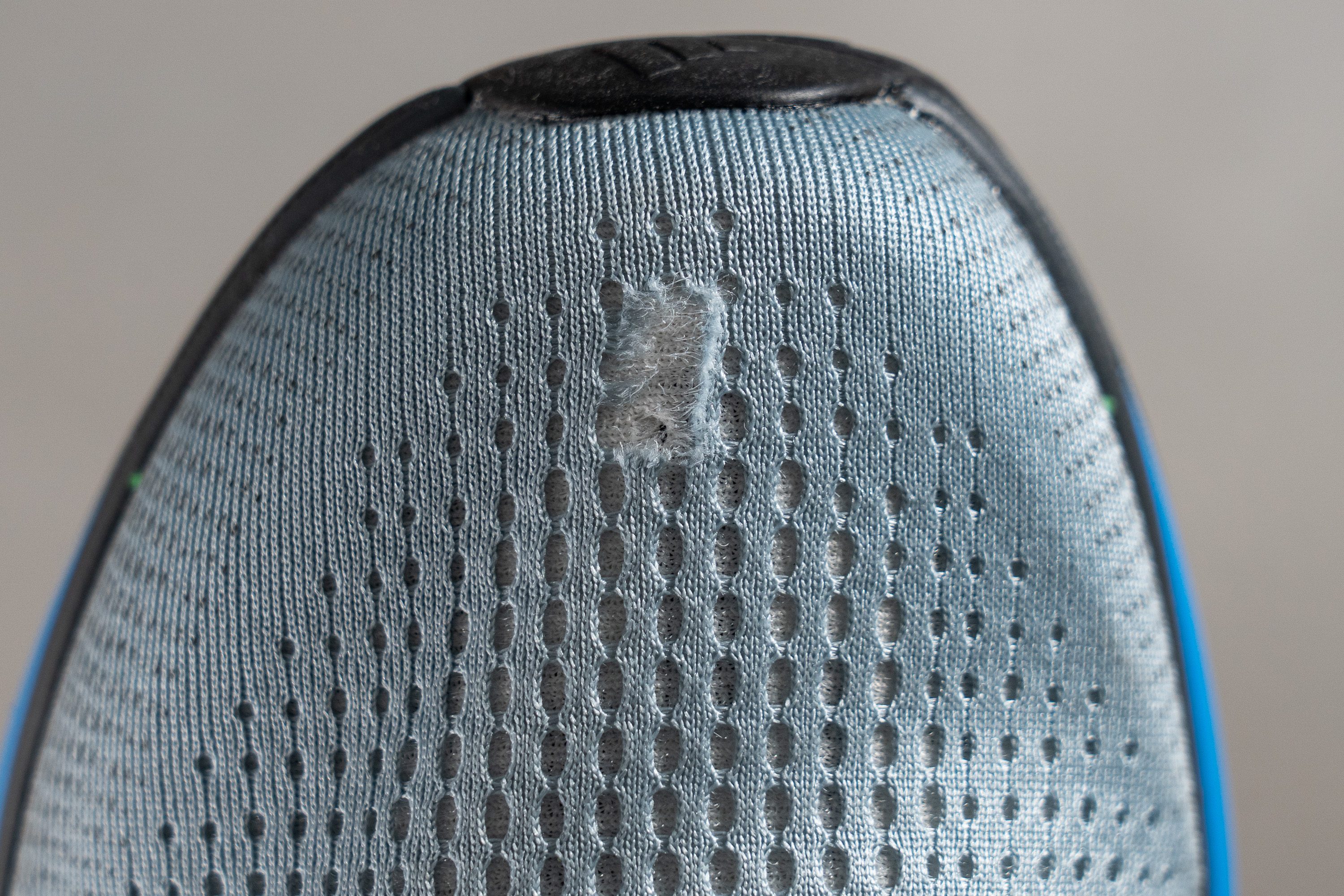
| Supernova Rise | 3 |
| Average | 2.6 |
Heel padding durability
We then turned our attention to the heel padding of the shoe, maintaining the same Dremel settings.
Our findings awarded a robust 4/5 score, slightly outperforming the toebox and leaving us in the lab with no doubts—it would be a rare thing for a runner to wear through the heel of the Supernova Rise.
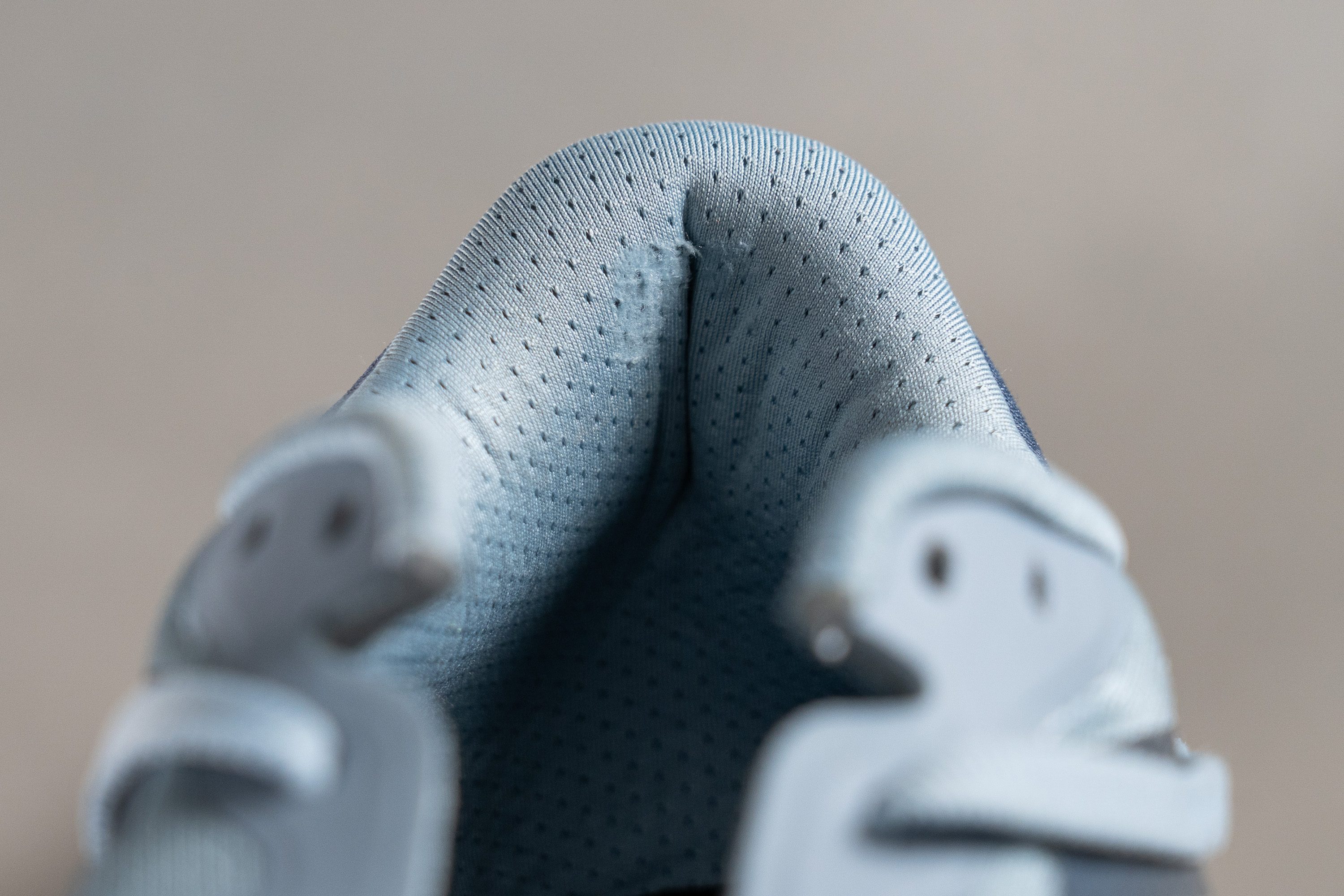
| Supernova Rise | 4 |
| Average | 3.4 |
Outsole durability
Concerned that a softer rubber might wear out too quickly, we put it to the test with our third Dremel examination.
To our delight, the rubber Adidas developed, though not the renowned Continental, performed really well. We observed a minimal 0.7-mm indentation, which stands as a testament to its durability.
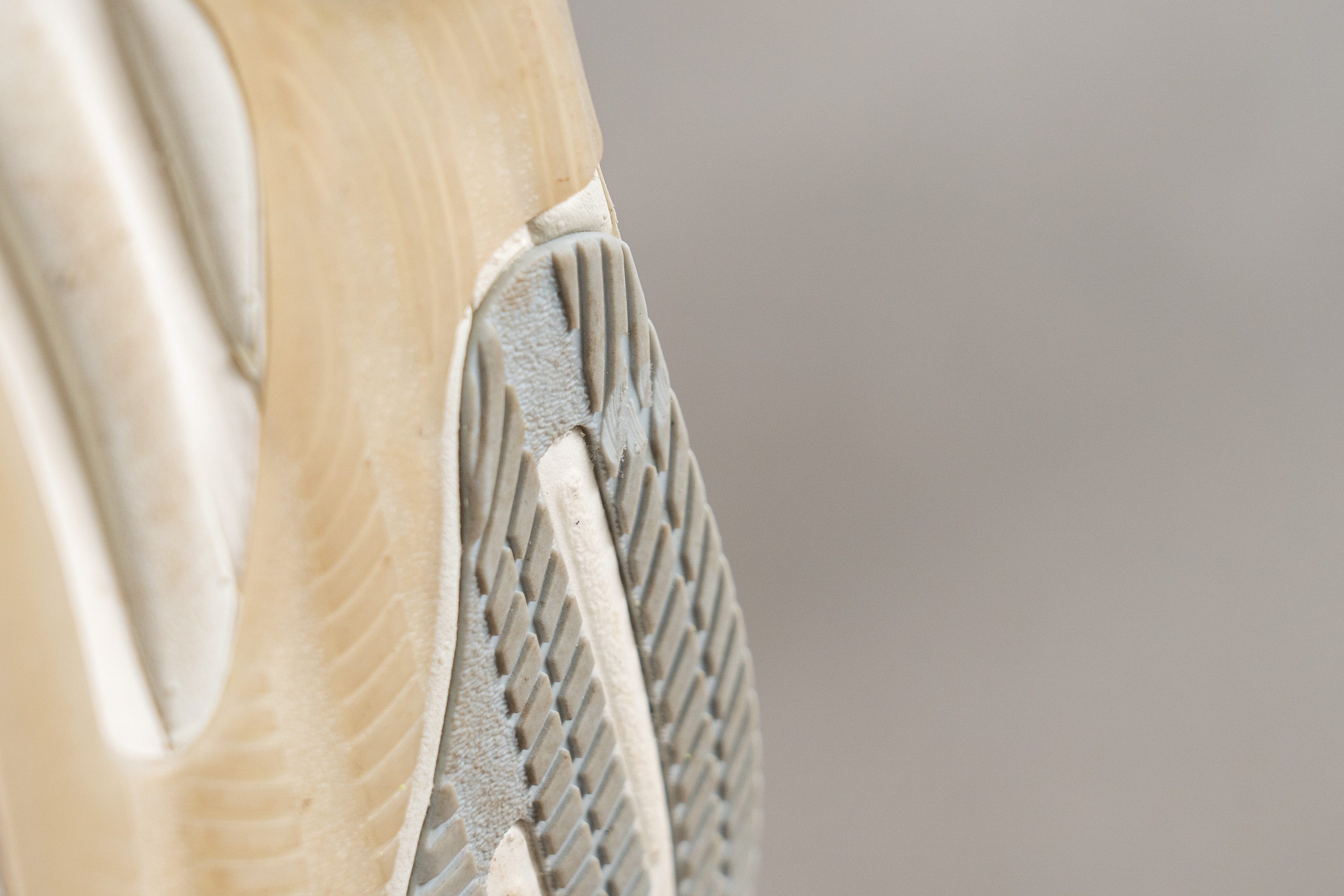
| Supernova Rise | 0.7 mm |
| Average | 1.1 mm |
Outsole thickness
Adidas was confident in their choice, and it showed in our findings—the outsole featured a mere 2.1 mm of rubber, thinner than that of many racing shoes.
This decision not only underscores the quality of the material but also plays a crucial role in managing the shoe's weight, as you'll see next.
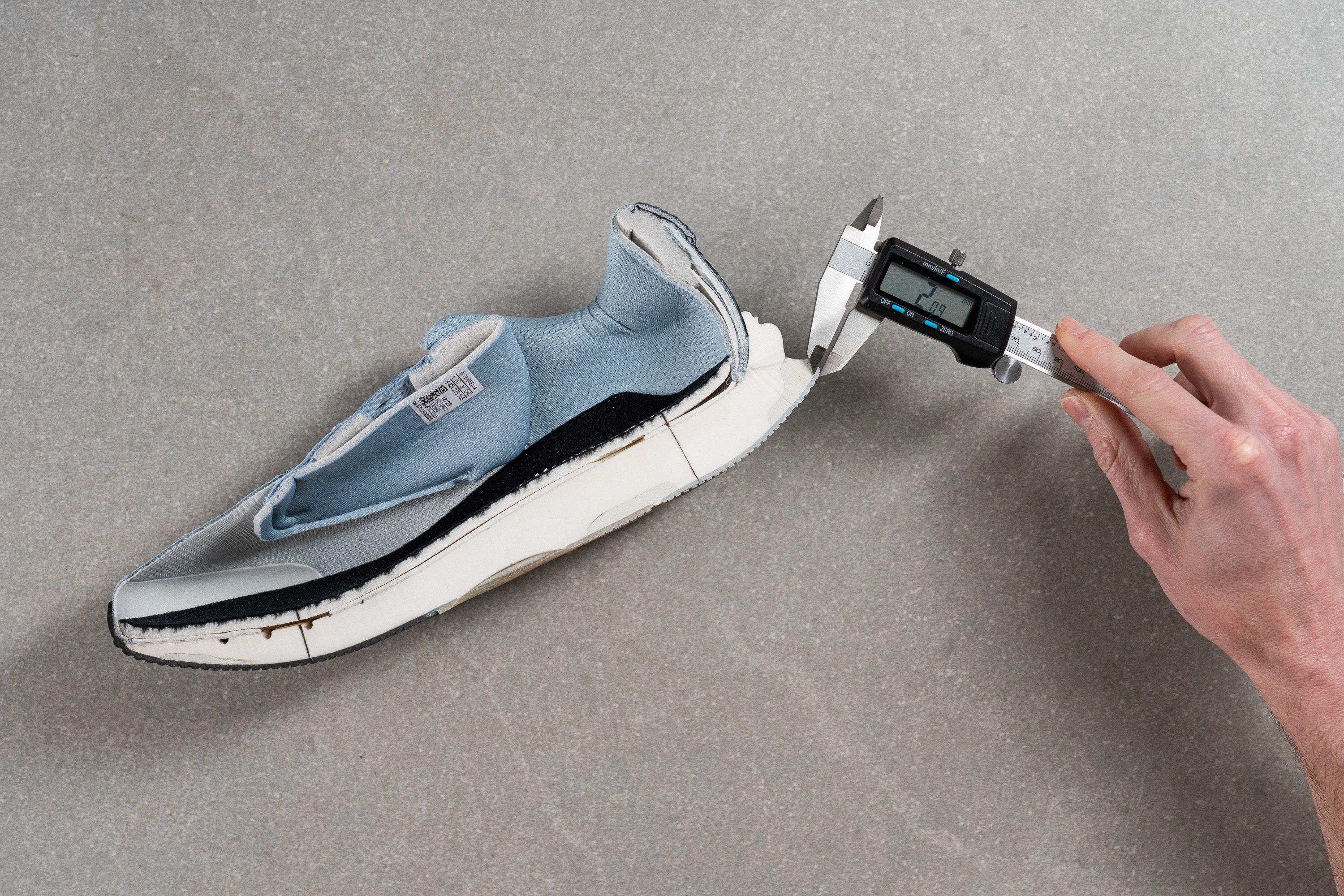
| Supernova Rise | 2.1 mm |
| Average | 3.2 mm |
Misc
Insole thickness
The 5.0 mm insole of the Supernova Rise significantly enhances the shoe's overall comfort.
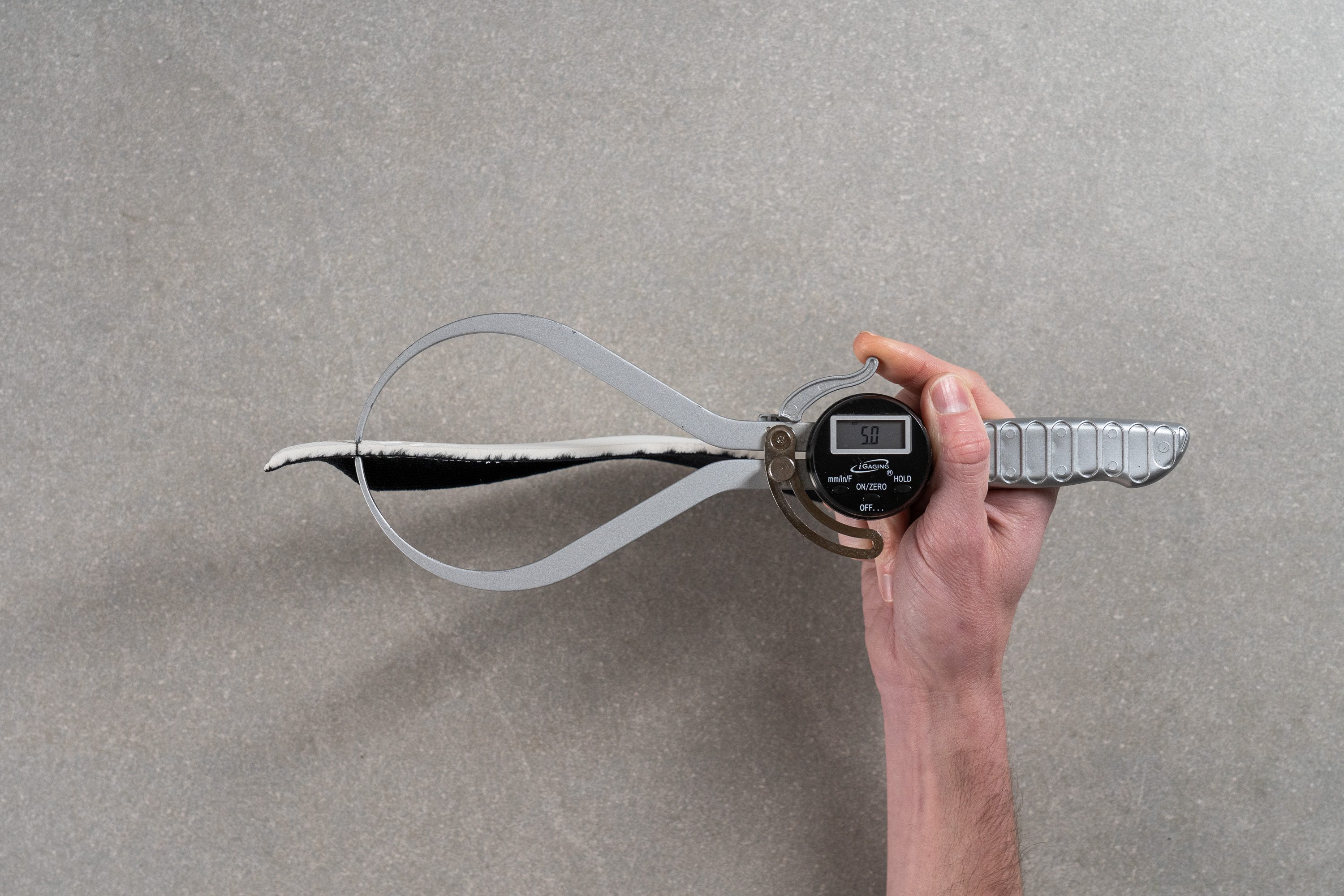
| Supernova Rise | 5.0 mm |
| Average | 4.5 mm |
Removable insole
The insole is not glued, and with its standard dimensions and thickness, we anticipate that swapping in custom orthotics or sockliners from other shoes should be hassle-free for everyone.
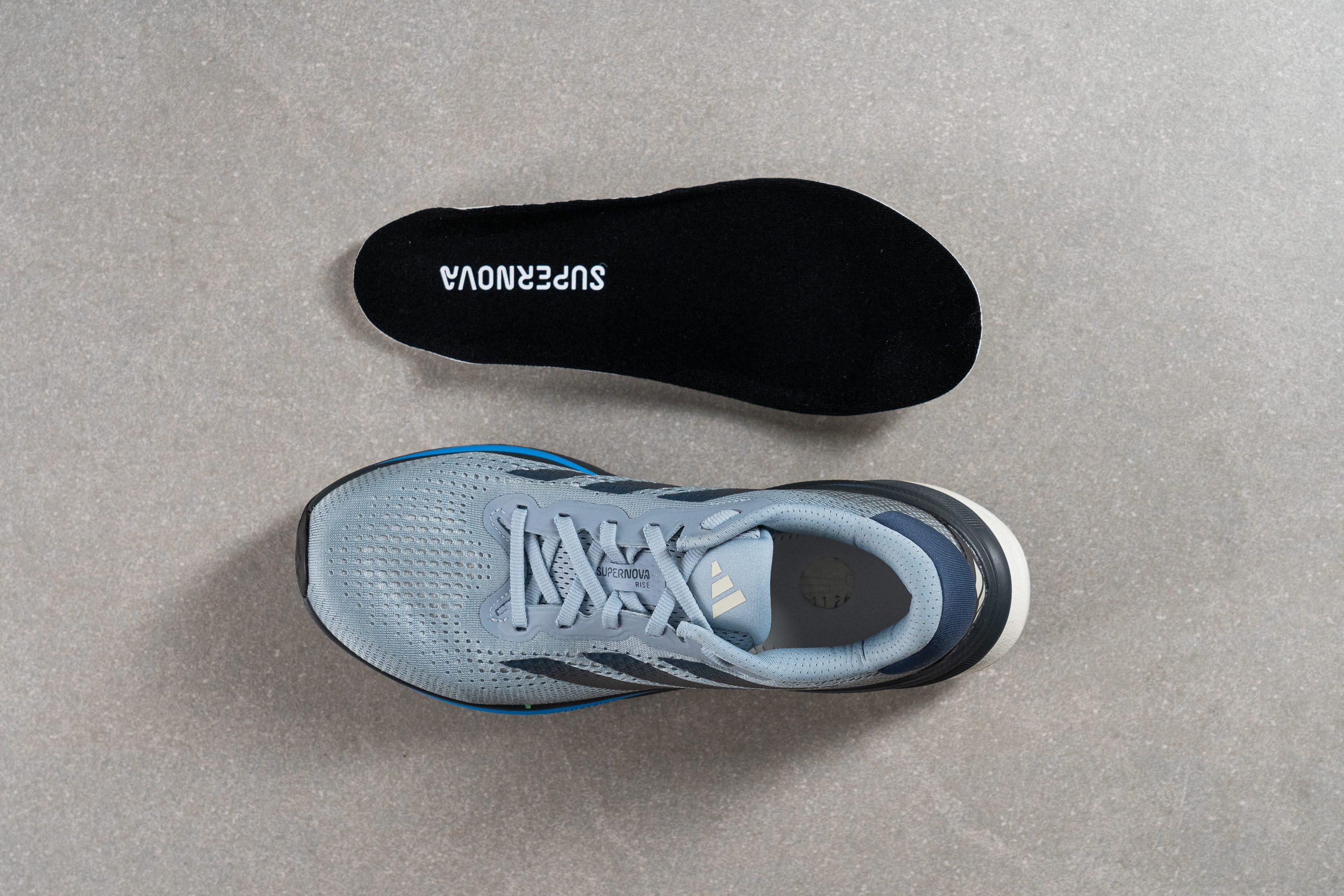
| Supernova Rise | Yes |
Midsole softness in cold (%)
Opting for a PEBA-based foam brings a notable side benefit—enhanced performance in cold conditions, a clear leap over the standard EVA foam used in many daily trainers.
The Supernova Rise excelled in our 20-minute freezer test, hardening by just 12.4%, showcasing its superior cold-weather adaptability.
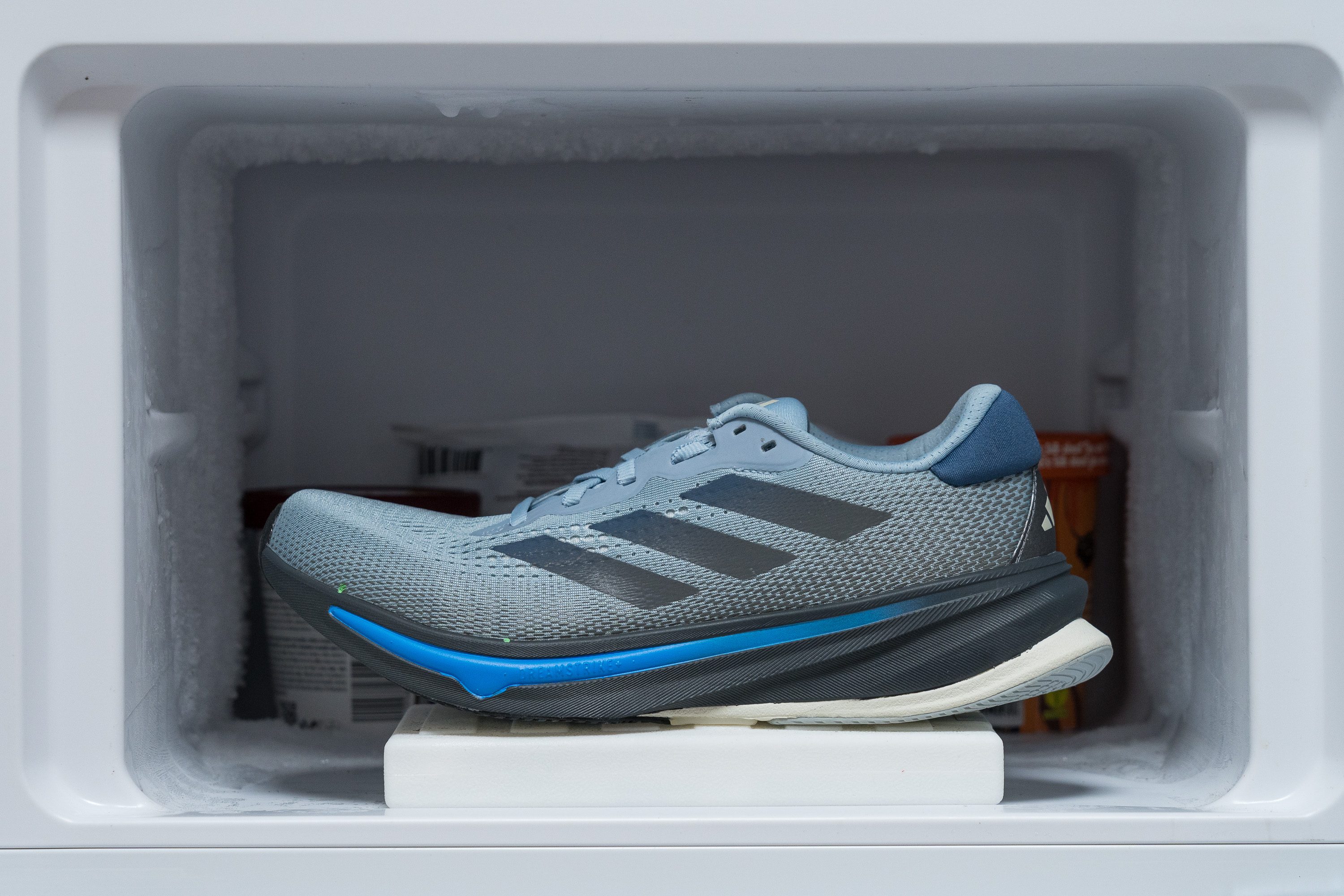
| Supernova Rise | 12% |
| Average | 24% |
Reflective elements
It would have been disappointing for the Supernova Rise, excelling in areas like value and stability, to lack reflective details. Fortunately, we're pleased to report that it includes them, enhancing visibility and safety at night.
| Supernova Rise | Yes |
Tongue padding
While the tongue's lack of gusseting was a letdown, its generous thickness—measuring at 9.9 mm with layers of foam—offers a redeeming quality.
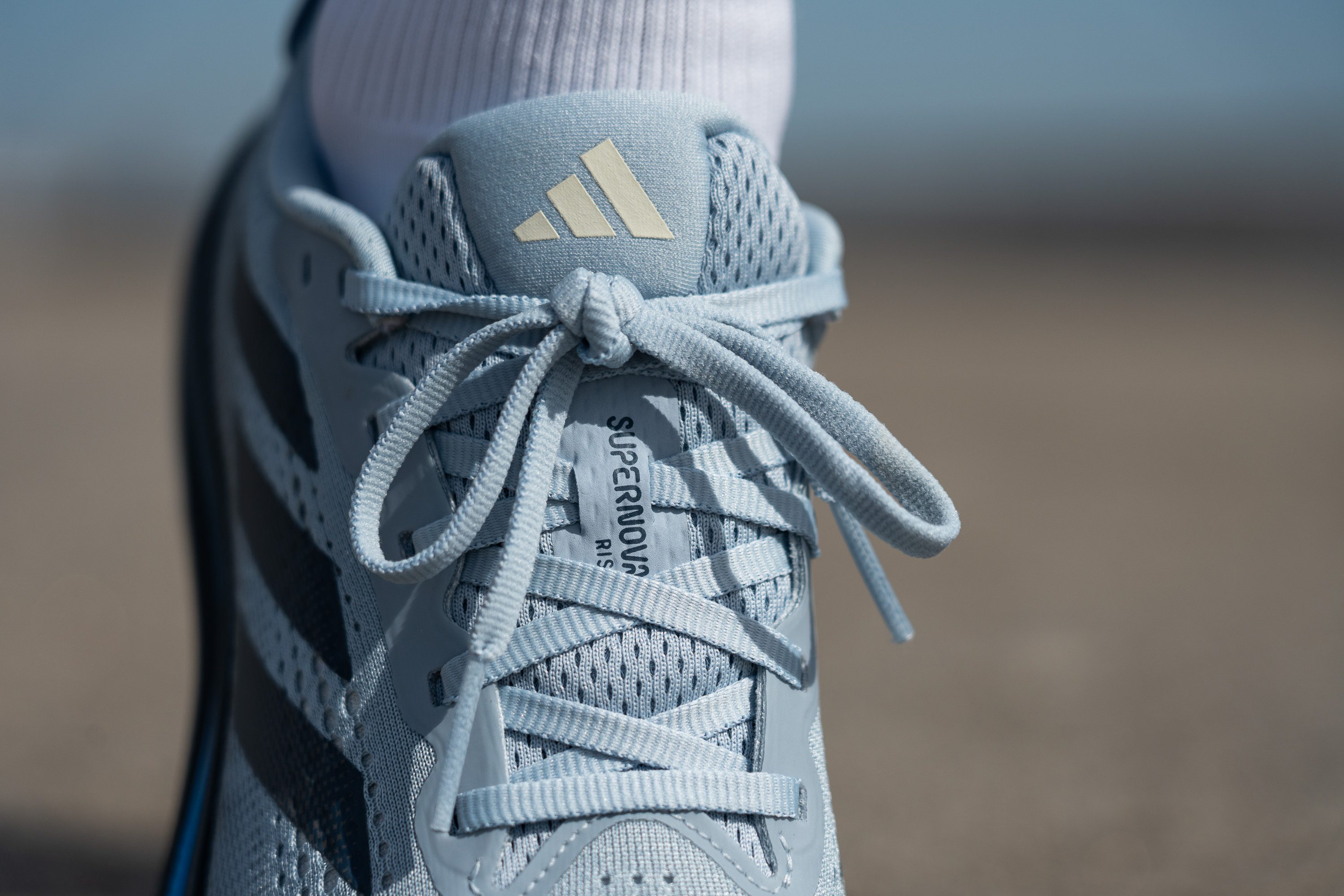
This design ensures there's no discomfort, making it one of the most luxuriously plush and comfortable tongues we've encountered in our recent tests.
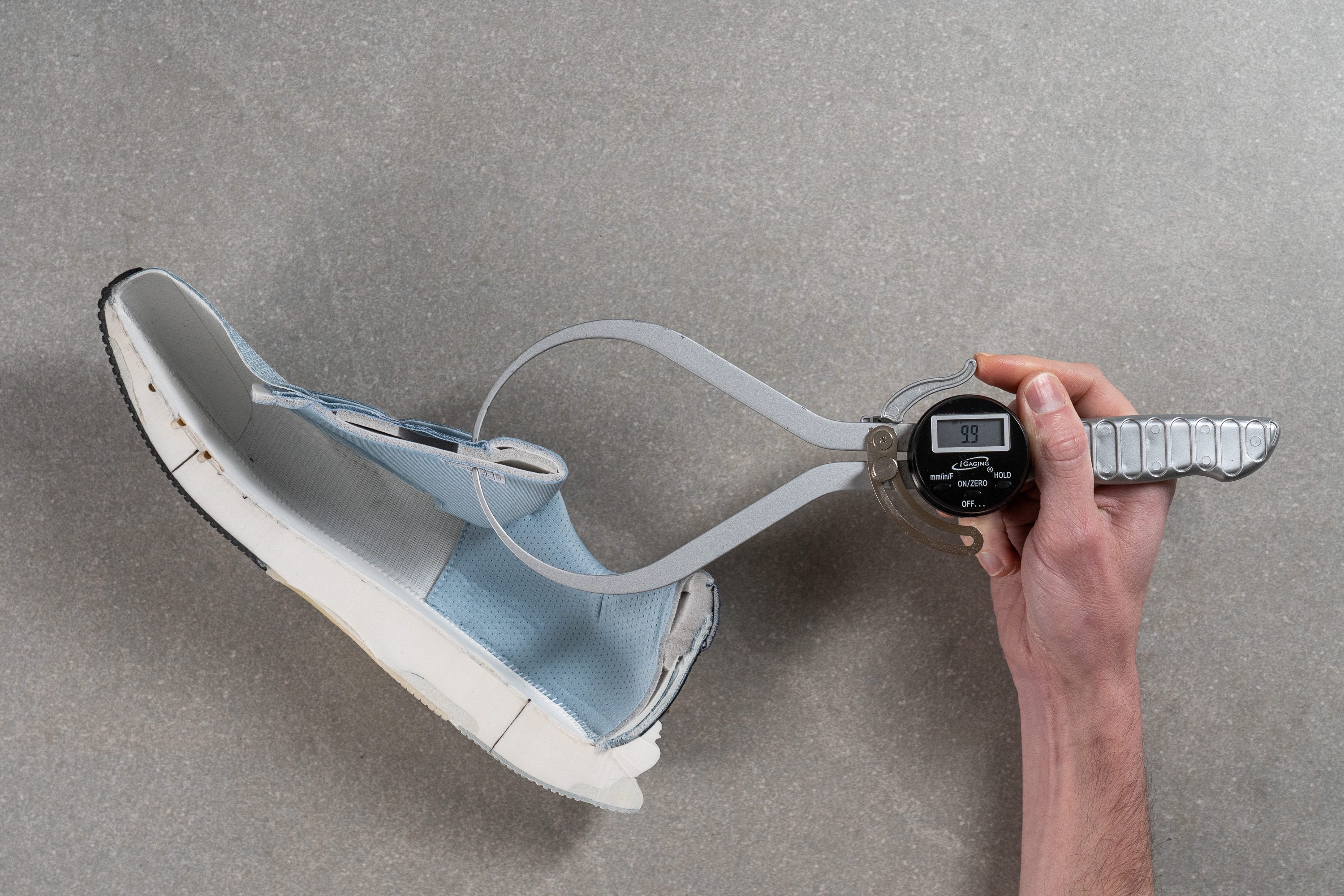
| Supernova Rise | 9.9 mm |
| Average | 5.7 mm |
Tongue: gusset type
The tongue isn't gusseted, leaving it free to move around, which is particularly troublesome in a shoe with a wide upper.
This tendency for the tongue to shift, especially at higher speeds, is quite disappointing in an otherwise solid shoe. It's a straightforward issue to address, so perhaps we'll see it gusseted in version 2?
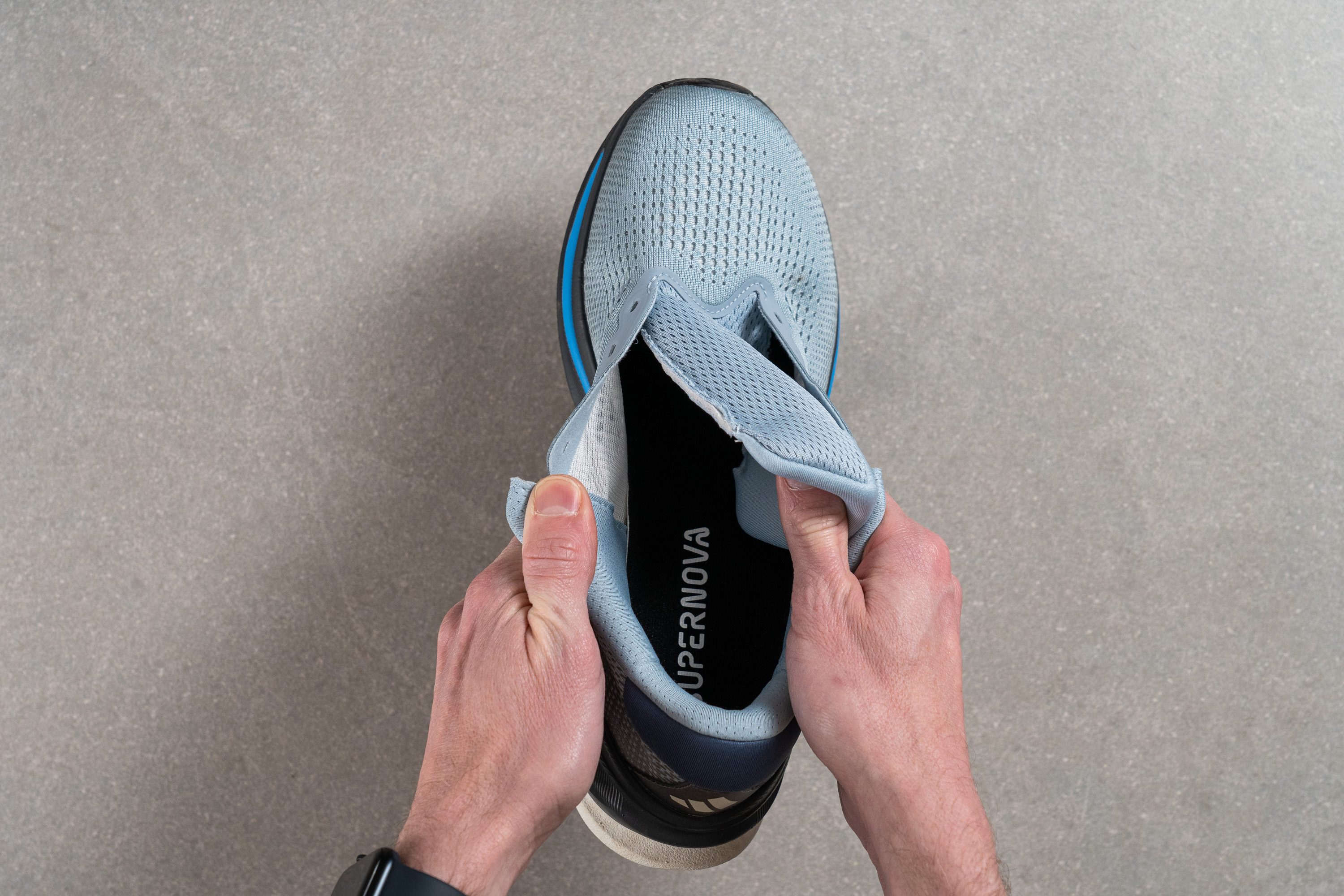
| Supernova Rise | None |
Heel tab
We noticed the absence of a heel tab, consistent with Adidas' recent trends in their training line designs. Conversely, the Adizero line typically includes a pull tab.
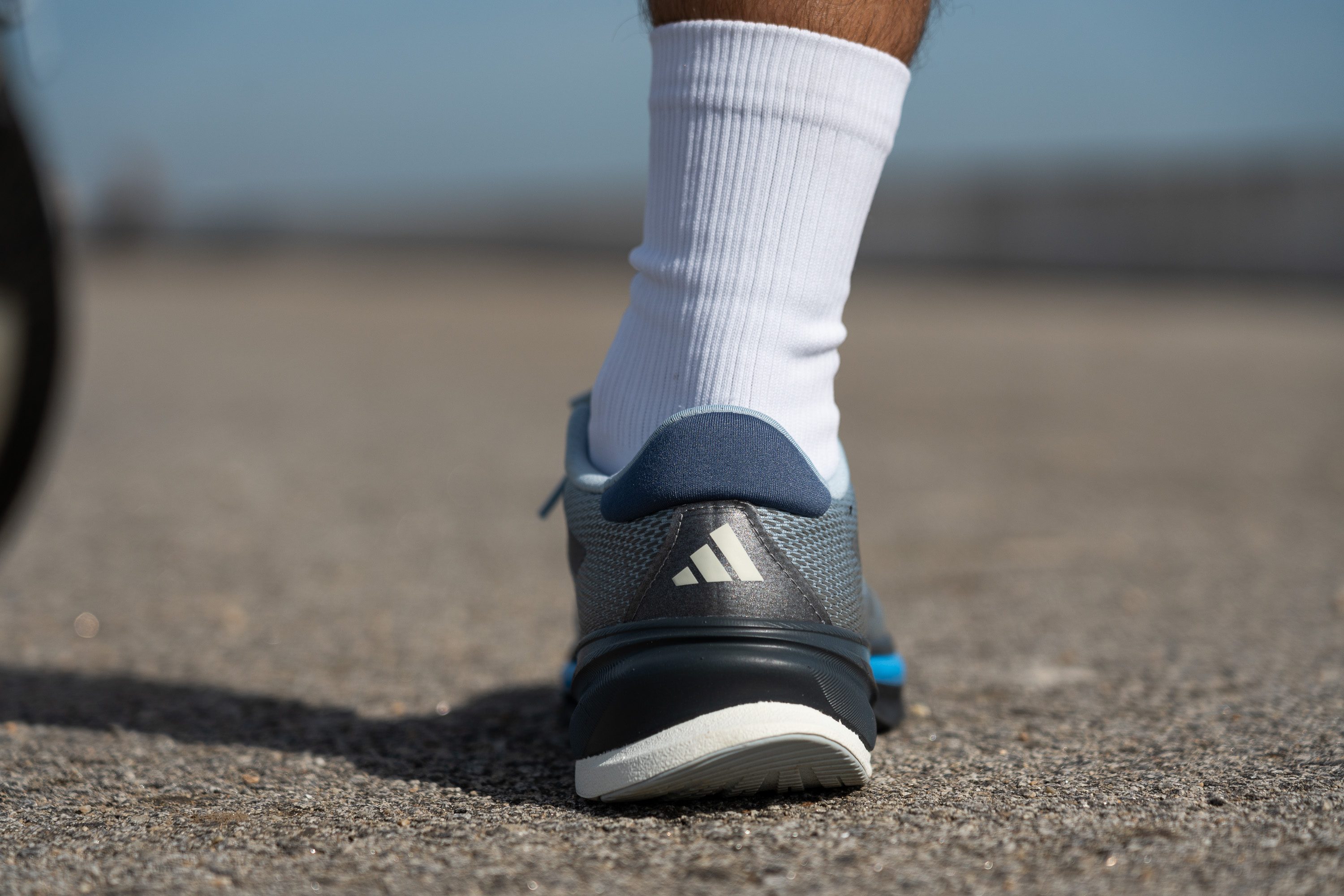
| Supernova Rise | None |

